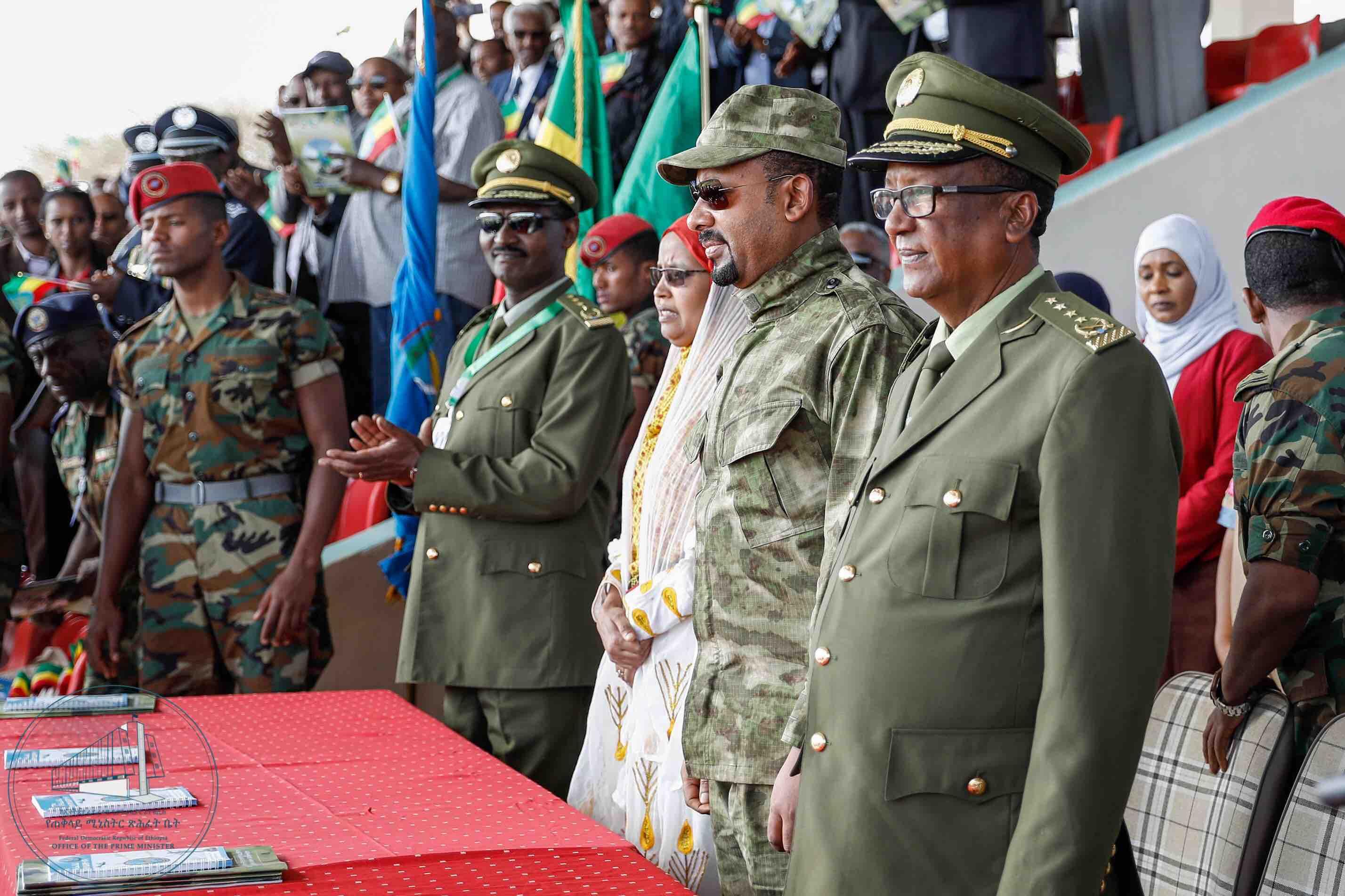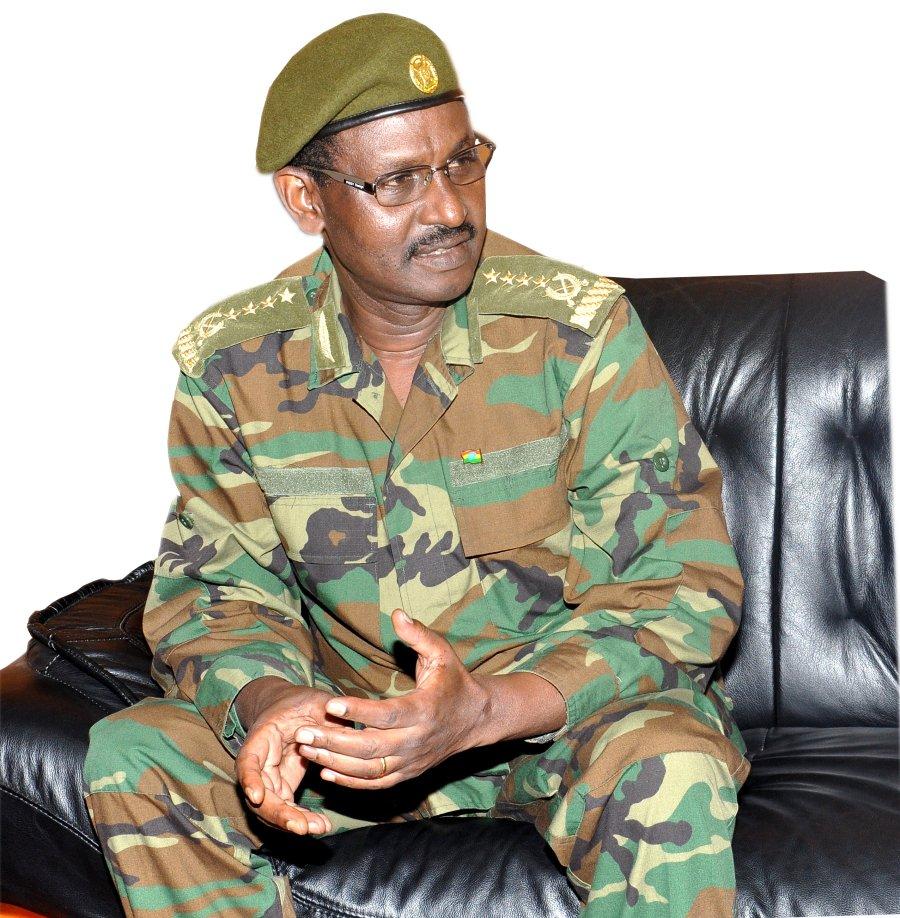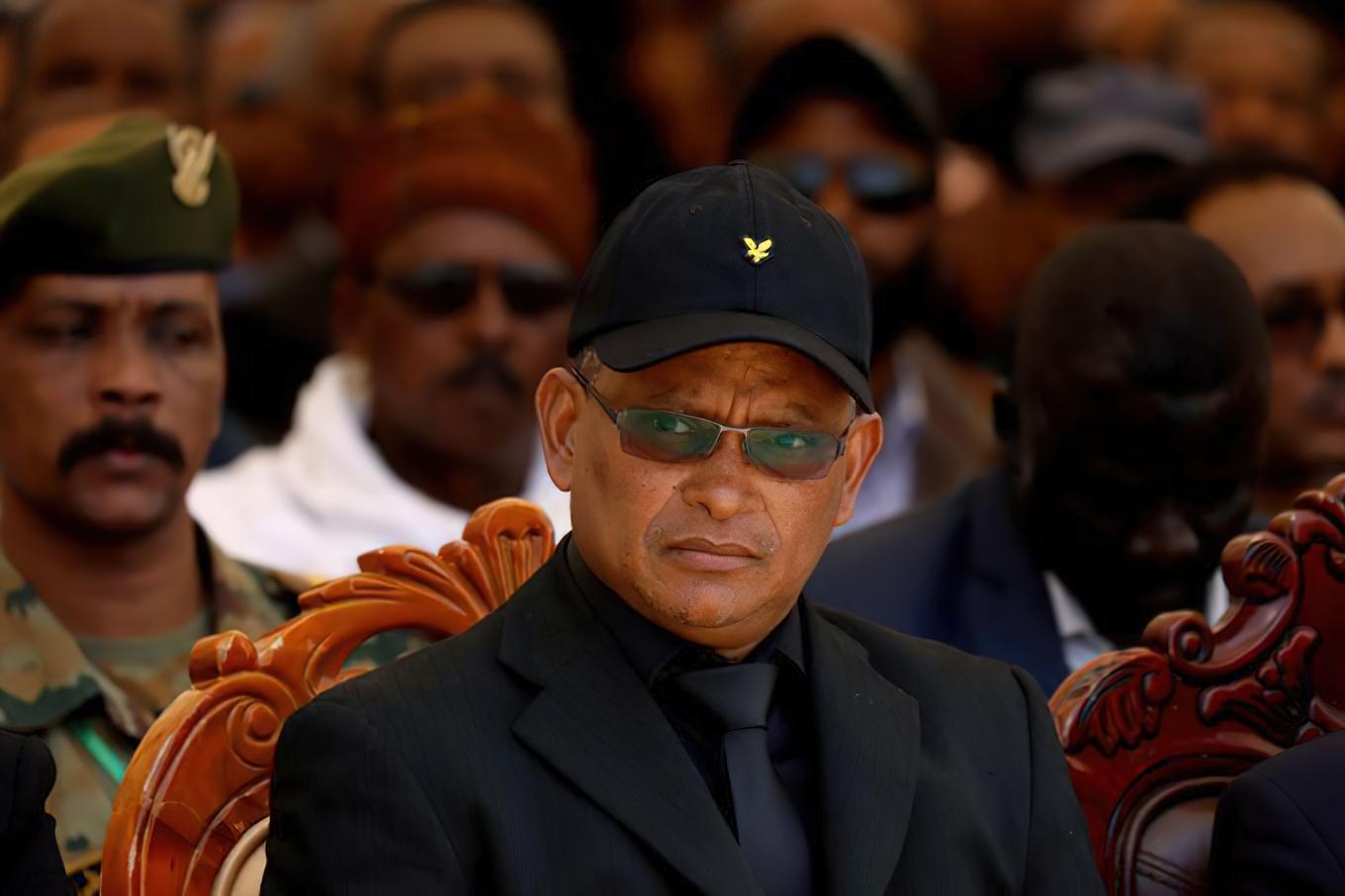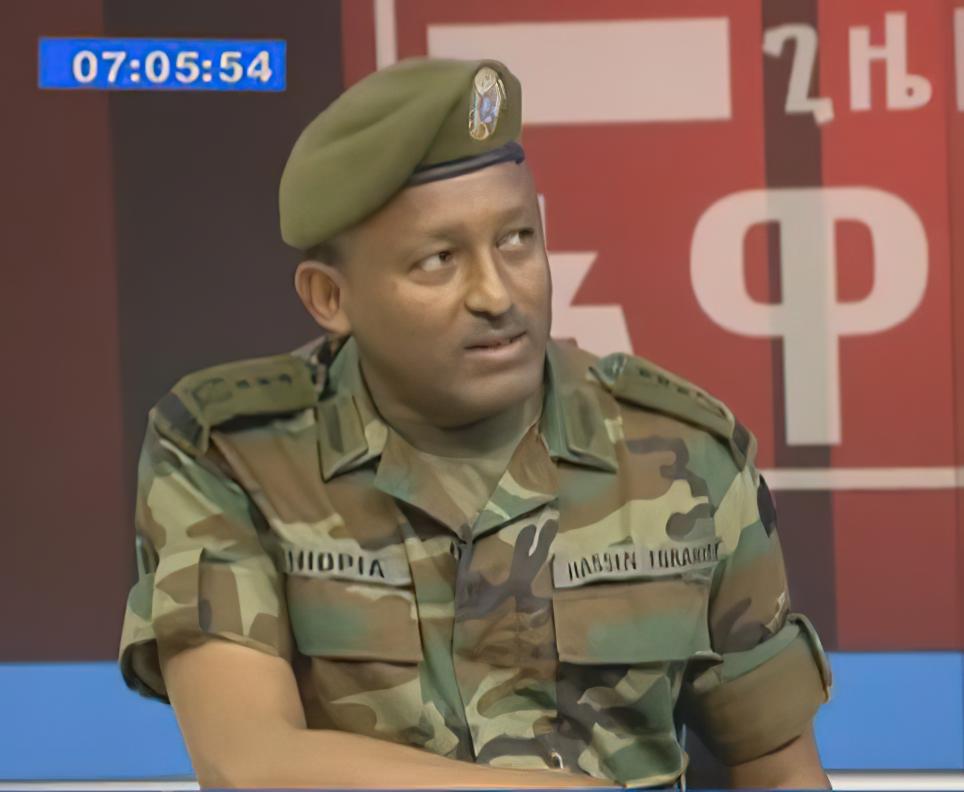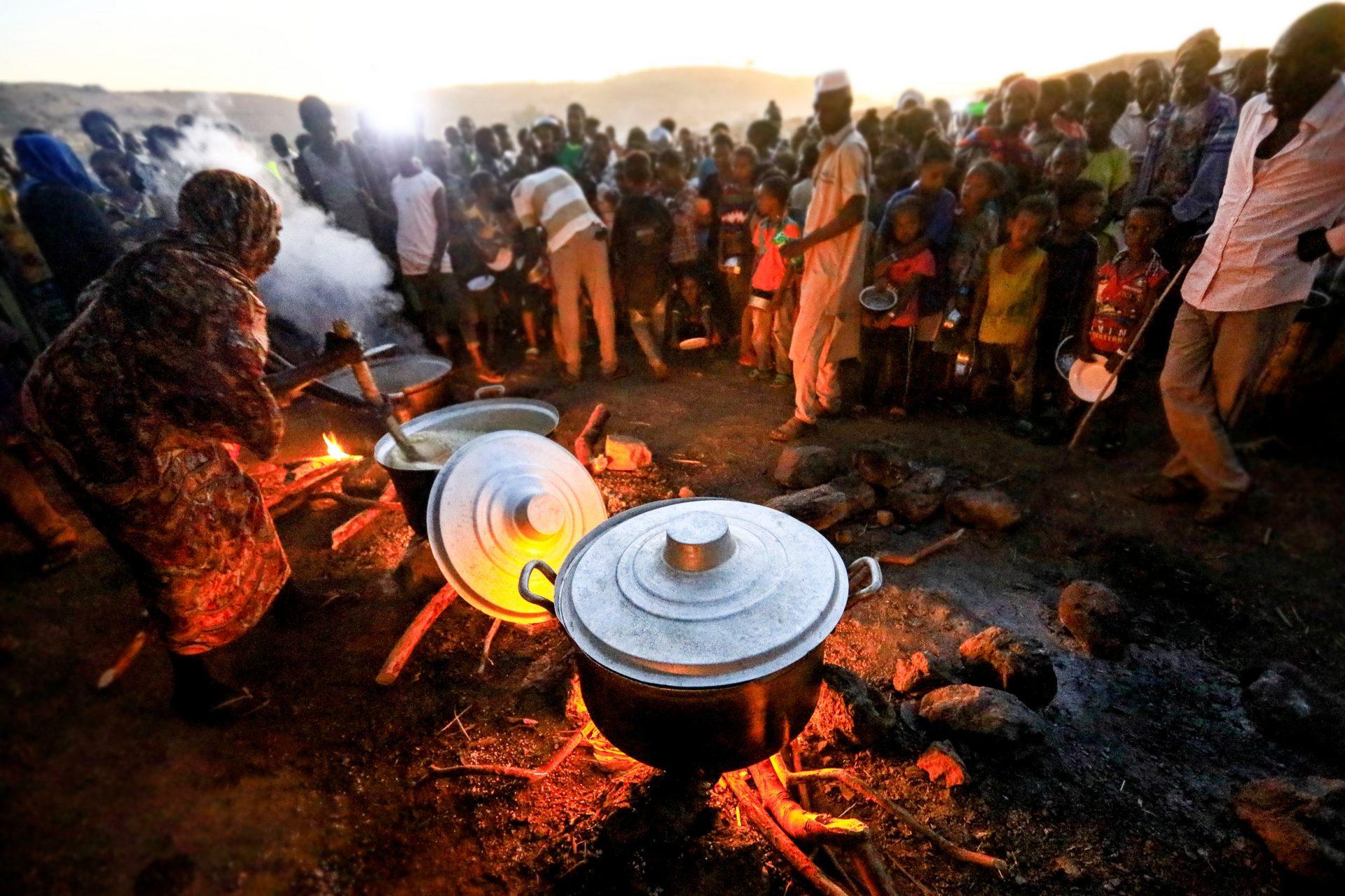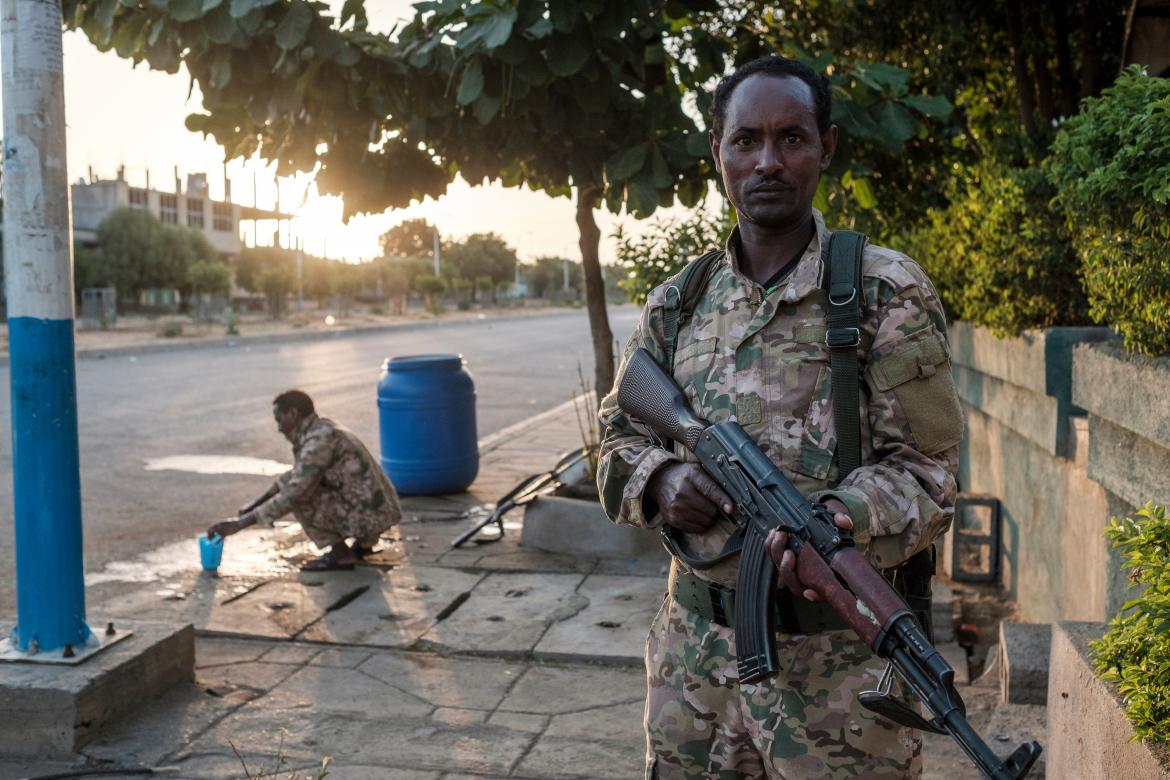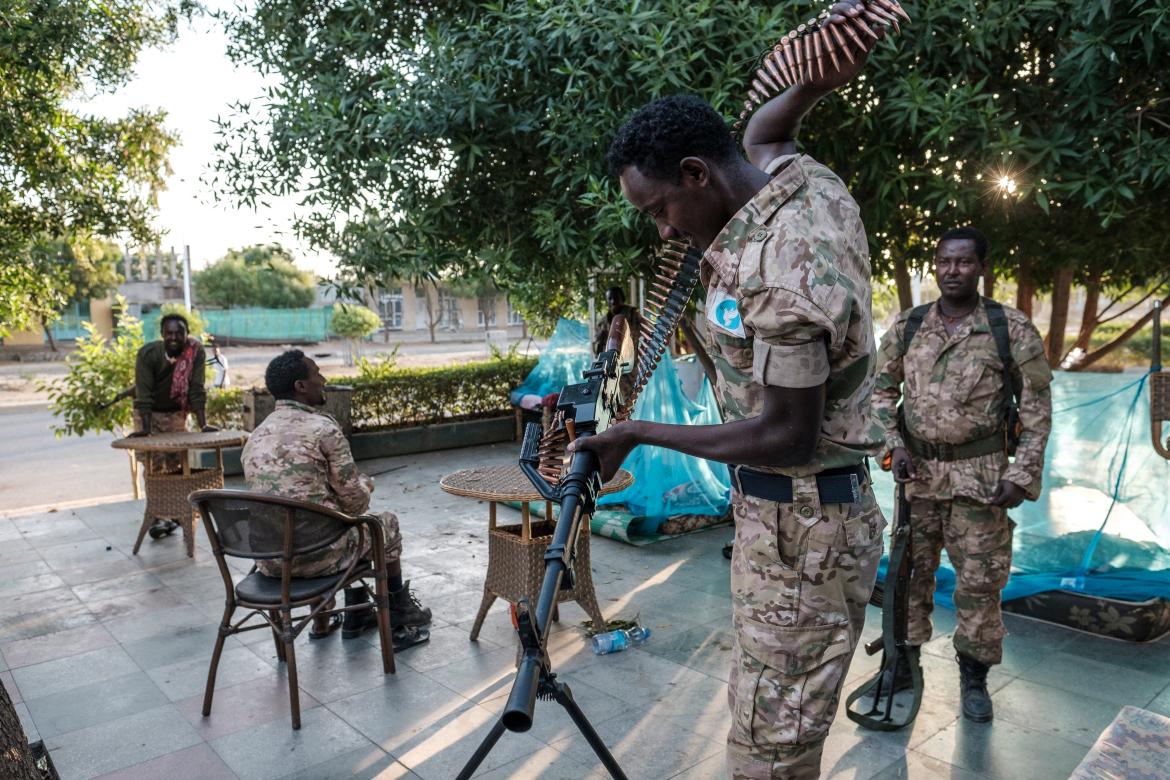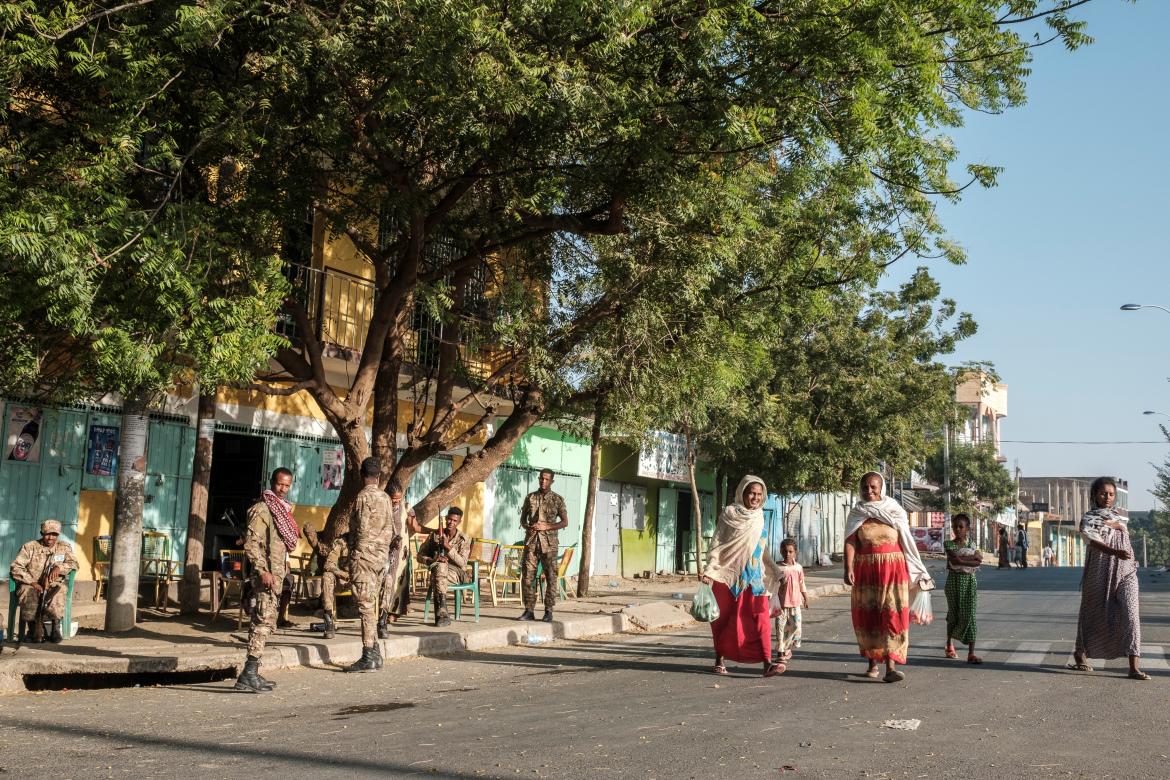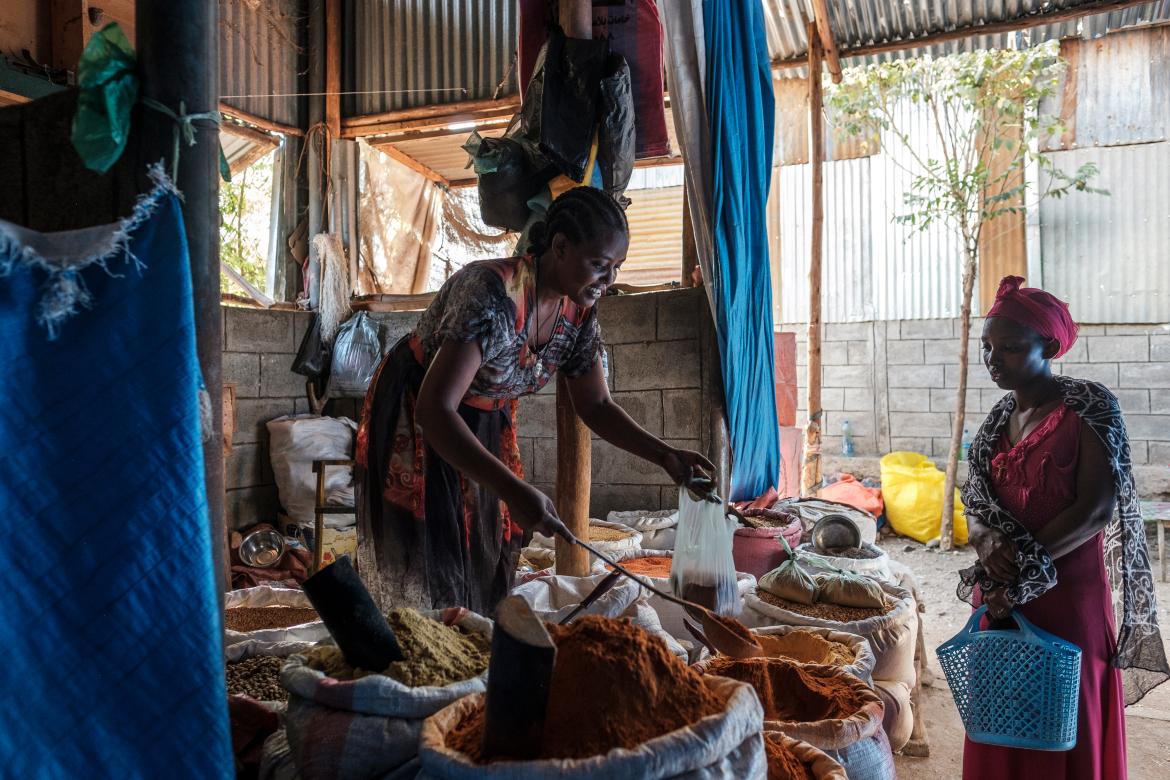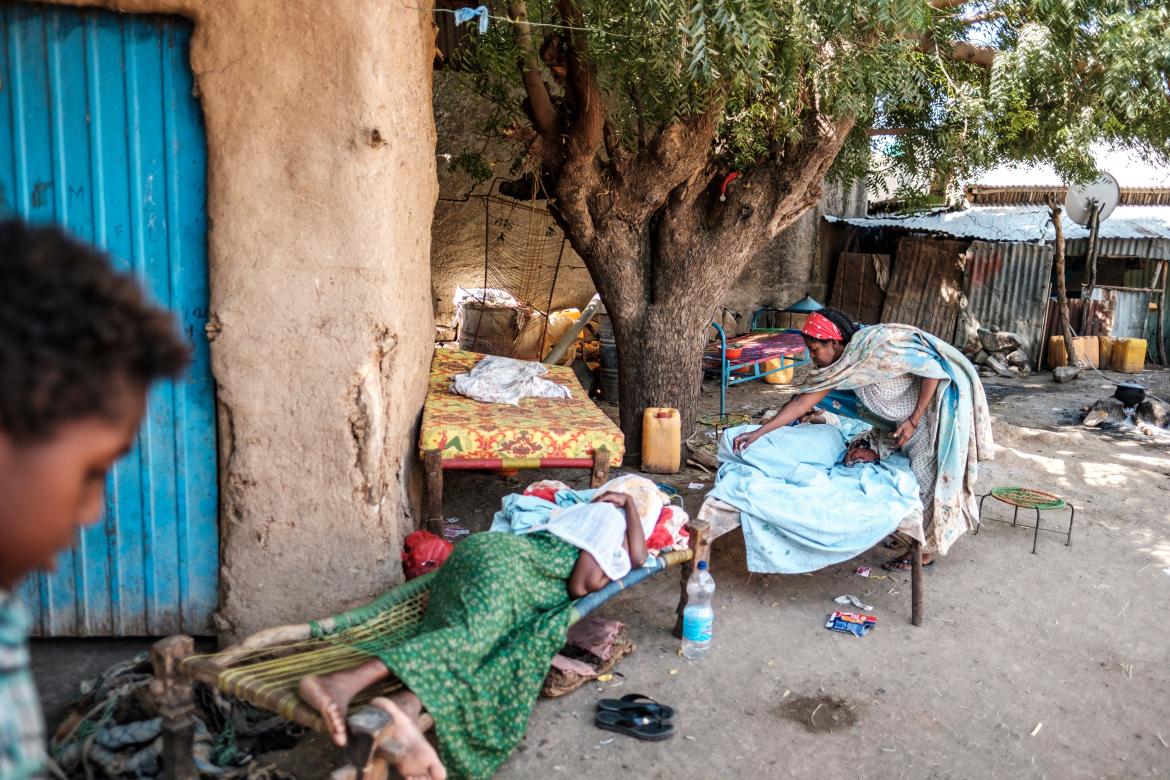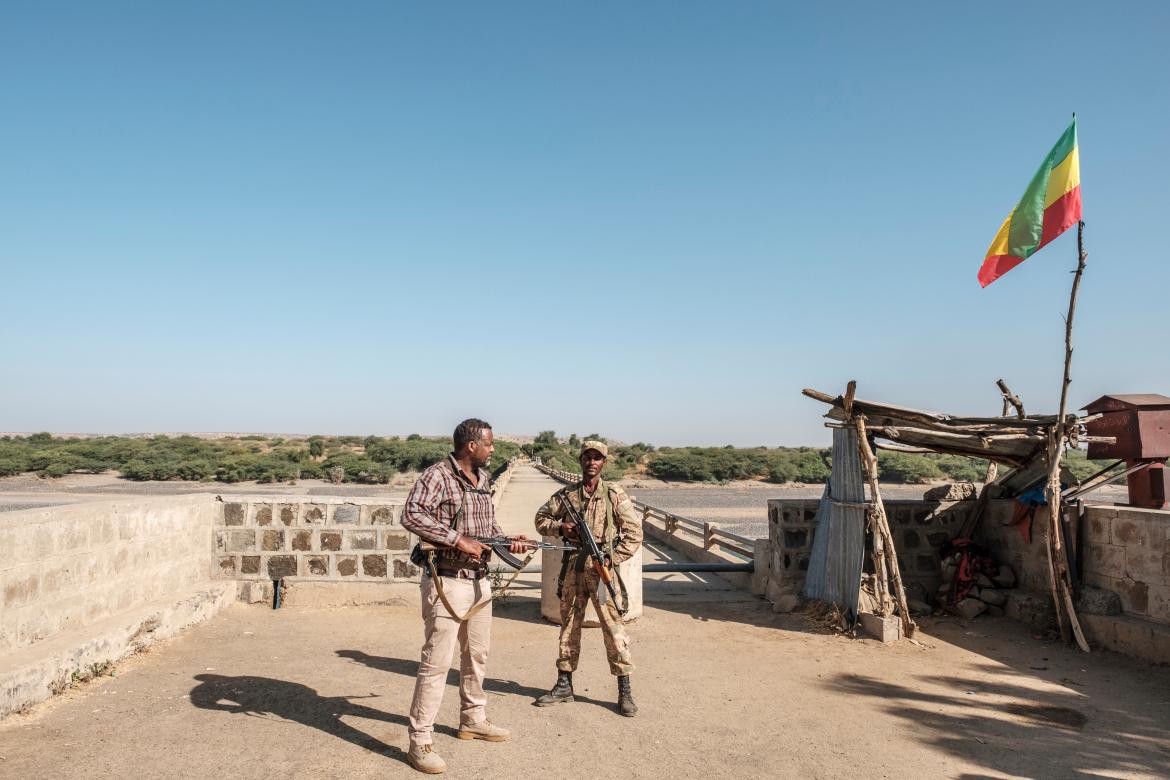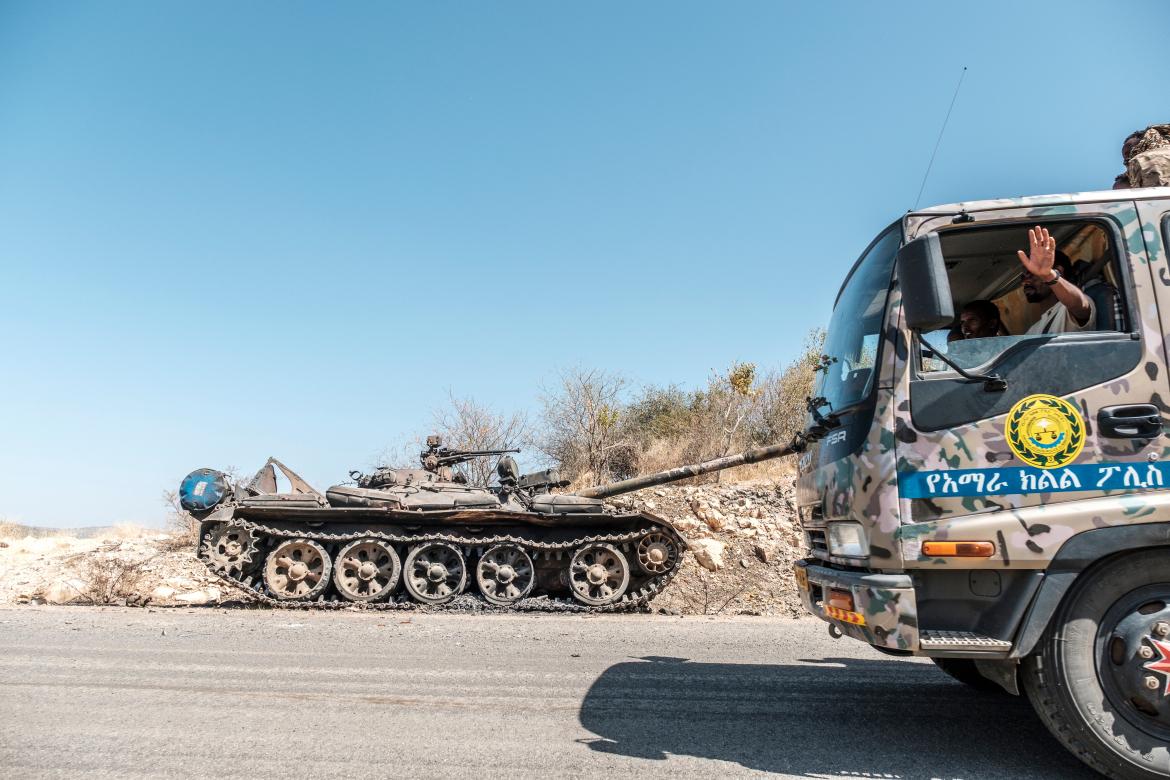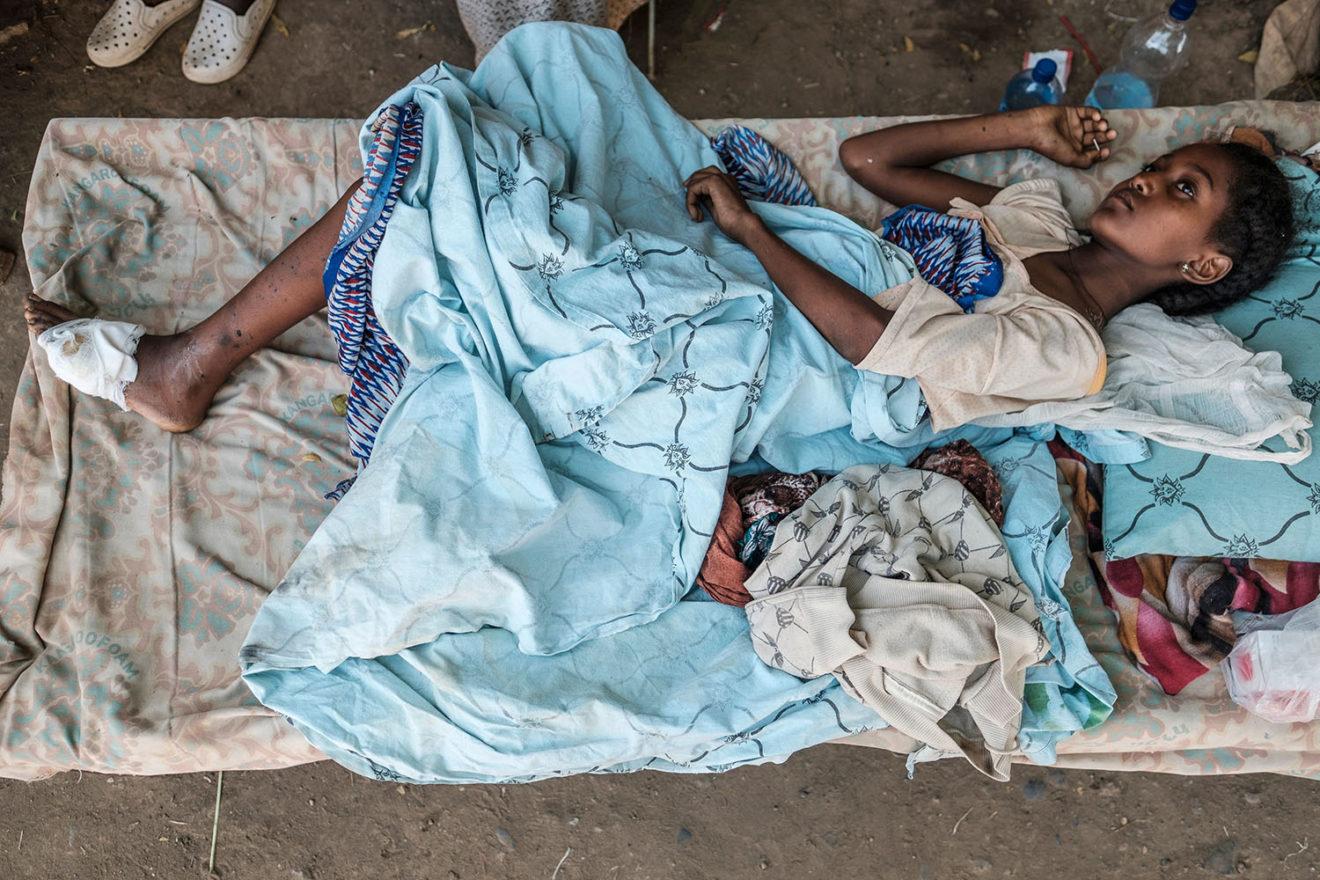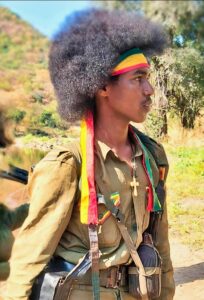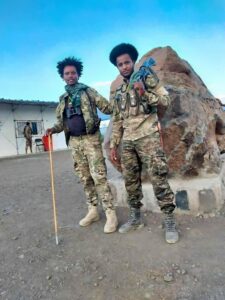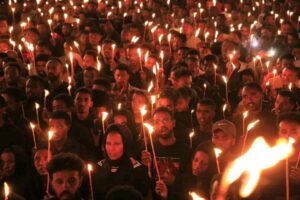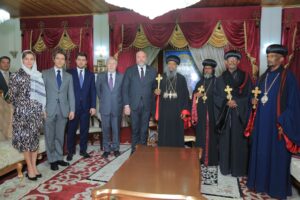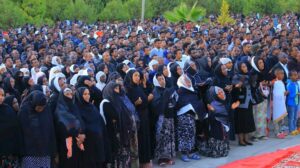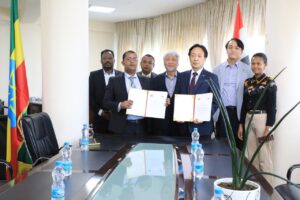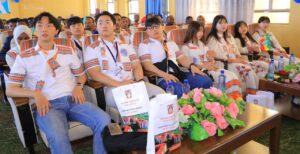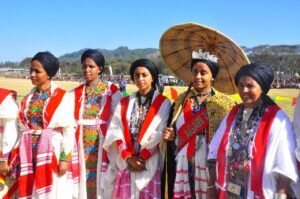Ethiopia › Forums › Food for thought › The war in Tigray is being complicated by ideological ambitions
-
AuthorPosts
-
11th November 2020 at 5:14 pm #137
The war in Tigray is being complicated by the ideological ambitions of Prime Minister Abiy Ahmed; Eritrean President Isayas Afeworki’s thirst for vengeance; and the irredentist territorial claims of the Amhara branch of Prosperity Party.

By By WORKINEH TESHOME
Hundreds killed and many more wounded in the raging fight between the Ethiopian military and regional forces in the northern state of Tigray. Tigray leaders on Monday appealed to the African Union to intervene and mediate between the warring parties as Prime Minister Abiy Ahmed vowed to “wrap up” the operation “soon.” The United Nations is warning that the conflict could displace tens of thousands of people, including refugees and one million people who already rely on safety-net assistance.
The conflict is already spilling into Ethiopia’s neighbors. Thousands of Ethiopians, including army soldiers, are fleeing to neighboring Sudan. Sudan has massed troops on its eastern border while Tigray leaders allege that Eritrean forces have joined the fight from Humera and Badme fronts.
The immediate causes of the deepening conflict are complex and not straightforward. There are four major factors at play: power centralization, territorial irredentism, ideological and historical factors.
A quest for total control
Prime Minister Abiy used the Oromo Protests to usurp power from the Tigrayan-dominated Ethiopian People’s Revolutionary Democratic Front (EPRDF) in April 2018. He then ignored all the demands of the protesters and has been busy consolidating personal power. He did this by dissolving the ruling parties of all regional states, except the Tigray People’s Liberation Front (TPLF), which governs the Tigray State. TPLF was the dominant party in the EPRDF. Abiy’s Prosperity Party (PP) now administers eight regional states and two federally managed cities.

Abiy Ahmed’s centralizing tendencies and undemocratic practices had already cost him his Oromo base. He has either detained, co-opted, or systematically silenced major leaders of Oromo political parties, including key allies who facilitated his rise to power. As a result, the Abiy administration is now facing both non-violent and armed resistance in the Oromia state. As authorities ramp-up the war effort in Tigray, the internet, and telecom services have – once again – been cut in western Oromia, where the federal army has fought a low-level insurgency for more than a year.
Abiy’s ultimate goal is to assert total control over the Tigray state. Toward that end, PP leaders and its social media troll army are calling for the total annihilation of TPLF once and for all. In the past two years, TPLF leaders have challenged Abiy’s efforts to monopolise power. Thwarted at every turn, Abiy is now trying to extend his hegemonic ambitions to Tigray through the use of force, including airstrikes. The House of Federation has already established a transitional government, accountable to central authorities, in the restive state.
Tensions between TPLF and Abiy escalated in September after Tigrayan leaders held a regional election in defiance of the federal government’s decision to indefinitely postpone elections scheduled for August. Federal authorities dismissed the Tigray poll and its government as illegitimate, severing ties with it and suspending federal grants. Tigray leaders countered by refusing to cooperate with the Abiy government and recalling its members for the national parliament. Since then, both sides have been busy preparing for war.
Amhara irredentism
At the heart of the ongoing clash is also unresolved territorial claims. The Amhara nationalists have been projecting claims over territories drawn into the Tigray state in the 1990s. These disputed pockets include Welkait-Tegede and parts of Raya. Amhara nationalists have formed several committees (አስመላሽ ኮሚቴ) to facilitate the return of these “lost territories” to the Amhara state.
Tigrayan nationalists refute these claims as an extension of what is commonly known as Neftegna imperialism. Neftegna is an imperial rule by Amharic speaking gun-holders, and a feudal political economy, in which no group is recognised to possess its own language, identity, land, and subnational administration in Ethiopia.
Neftegna literally means bearers of the ‘neft’ or the gun. In our contemporary context, Neftegna refers to a repressive system that uses the barrel of the gun to impose its totalizing and homogenising ideology on the local population.
It is clear that Amhara nationalists, especially leaders and members of the National Movement of Amhara (NaMA) and the Amhara branch of PP are backing “the war on Tigray” because of these irredentist claims. It is also no accident that an active war is being waged between Amhara (supported by the army) and Tigray special forces and militia along with the Welkait-Tegede districts.
The territorial dispute also highlights the divergent goals of the ongoing military campaign. For the Amhara elite and dominant ruling class, it is all about regaining “lost territories” and subduing a formidable foe across its northern border. Amhara activists are gleefully reporting that parts of Welkait is now under their region’s control. For Abiy, the immediate goal is to reassert control and eliminate the last remaining challenge to his budding dictatorship. For now, the two sides are aligned around their mutual detest for the multinational federal arrangement.
Ideological dimensions of the war
The idea of creating “one indivisible Ethiopian nation” out of many nations using the Amharic language and Orthodox Christianity as common signifies started during the reign of Menelik II. It was intensified by the homogenisation policy of Emperor Haile Selassie and the “Ethiopia First” project of the Derg. This assimilationist policy ended in 1991 with the victory of TPLF and other nationalist liberation fronts. With the introduction of multinational federalism, national groups attained constitutional rights to self-government in 1995.
For proponents of the old nation-building approach, the 1995 constitution was a “divide and rule” policy of the TPLF. They oppose language and cultural rights, as well as the restructuring of the Ethiopian state based on language. For example, the Ethiopian Citizens for Social Justice (EZEMA) and PP both advocate for the usage of Amharic as a means of “strengthening” national unity.
These anti-federalist forces condemn multinational federalism as “anti-unity” and have nicknamed it “ethnic-federalism.” They contend that TPLF is “the mother of all problems” facing Ethiopia. In particular, the fault TPLF for mobilising national and linguistic groups against “Ethiopianism.”
For them, Ethiopia’s unity can only be achieved on the graves of TPLF. Abiy’s supporters mistakenly believe that the demise of the TPLF would weaken ethno-national identities and group rights (ethno-nationalism) in Ethiopia, thereby widening spaces for “Ethiopianism.” They profess that once TPLF is destroyed, the remaining ethno-national forces can be easily squashed.
It should be crystal clear that the war in Tigray is an extension of Abiy’s ongoing ideological battle in Oromia, Sidama, Wolaita, and other areas in the South. He has already jailed or sidelined every formidable opponent in the Oromia state, where support for multinational federalism is near-unanimous. For now, Somali leaders are backing Abiy with the hope of increasing Somali’s influence and visibility in national politics. The Sidama are focused on setting up their new state. The Wolaita and the rest of statehood campaigners in the South are disenfranchised and subjected to arrest and intimidation.
Afeworki’s vengeance
The other significant aspect of the military campaign in Tigray is the Eritrea factor. Eritrean and Tigrayan forces cooperated to overthrow the Derg regime in 1991. However, both forces emerged deadly rivals, leading to a costly border war between 1998 and 2000, which left nearly 100,000 dead on both sides. Though the real reason for the war was different, it was officially framed as a territorial dispute over Badme and Shiraro, which are now under the Tigray administration. After the active war ended, the Ethio-Eritrean conflict remained frozen for two decades with little prospect for peace.

Abiy made a surprise visit to Eritrea just three months after assuming power. Since then, President Isayas Afeworki and Abiy have had several exchanges of visits. As a soldier, Abiy was part of the Ethio-Eritrean war. Now close allies, the relationship between the two leaders and their deals remain a mystery. Fundamentally, it is impossible to bring peace between the two countries by excluding Tigrayans, who share a long border with Eritrea. This is also why no progress has been registered after the historic peace deal, much less the institutionalisation of the agreement for which Abiy won the Nobel Prize. Isayas sees the TPLF leaders as mortal enemies and a threat to his one-man regime.
Tigray leaders allege that Ethiopian troops have defected to Eritrea and that Eritrean forces have joined the fight from the Humera front. It was only three weeks ago that Isayas visited the Ethiopian Air Force base in Bishoftu and was presumably briefed on the preparations for war.
The Abiy-Isayas rapprochement has been criticised as a short-sighted personal relationship forged against a common enemy, TPLF. Isayas is eager to see TPLF’s downfall to fulfill his vengeance. There are also those who suspect Isayas might be conspiring toward the disintegration of Ethiopia to emerge as the sole powerful man in the Horn of Africa. Isayas fought for 30 years to get independence from what he calls the Amhara dominated Ethiopian state. He did not consider a federal option with Ethiopia and created an Eritrean state. This same man, who then preferred secession to the federation, is now hypocritically denouncing federalism in Ethiopia. Isayas now sees federalism both in Ethiopia and Somalia as an indirect threat to his own rule in Eritrea.
Conclusion
The factors I have outlined above are complicating this unnecessary war. At the root of the current conflict is ideological and political differences over the future of the country. These issues cannot be settled through the use of force. No war has ever solved Ethiopia’s problem.
To be clear, all criminals within the TPLF should be brought to justice for corruption and gross human rights violations over the past 27 years. But it should also be clear that TPLF was not alone in committing those crimes. PP leaders cannot absolve themselves of the abuses of EPRDF by simply changing their hat. Most importantly, this is not a law enforcement operation to bring about justice or accountability.
Ethiopia needs an all-inclusive national dialogue and a unity government along with a roadmap for national elections. Any dialogue about the future of Ethiopia must be preceded by the release of all political prisoners. Criminals inside TPLF and PP should be dealt with through a transitional justice mechanism within the framework of that transition.
In the meantime, Abiy should be advised to stop the wars he is fighting in Tigray, Oromia and other parts of the country against insurgents and peaceful protesters. The international community should scale up mediation efforts to avert an all-out civil war with consequences far beyond Ethiopia’s borders.
Ethiopia Autonomous Media
24th November 2020 at 10:44 am #213The besieged capital of the embattled Tigray region
 Ethiopia’s government is again warning residents of the besieged capital of the embattled Tigray region as the clock ticks on a 72-hour ultimatum before a military assault, saying “anything can happen.”
Ethiopia’s government is again warning residents of the besieged capital of the embattled Tigray region as the clock ticks on a 72-hour ultimatum before a military assault, saying “anything can happen.”Senior official Redwan Hussein told reporters Monday that the Tigray regional leaders are “hiding out in a densely populated city; the slightest strike would end up losing lives.”
Human rights groups and others were alarmed over the weekend when Ethiopia’s military warned civilians in the Tigray capital, Mekele, that there would be “no mercy” if they don’t “save themselves” before the offensive to flush out defiant regional leaders. Amnesty International warns that deliberately attacking civilians and civilian objects “is prohibited under international humanitarian law and constitutes war crimes.”
Abiy Ahmed, Ethiopia’s Nobel Peace Prize-winning prime minister, issued a 72-hour ultimatum Sunday for the leaders of the Tigray People’s Liberation Front, or TPLF, to surrender.
Redwan said that Mekele, a city of around 500,000 people, is now encircled at a distance of about 50 kilometers (30 miles), and with rougher terrain left behind “what remains is the plain land, easier for tanks.”
He added, “by providing a brute fact, it is letting people to understand the reality and make the right choice.” Ethiopia’s government is urging Mekele residents to separate themselves from the TPLF leaders in time.
Ethiopia’s government again rejected international pleas for dialogue with the TPLF leaders, regarding them as criminals on the run.
The heavily-armed TPLF dominated Ethiopia’s ruling coalition for more than a quarter century before Abiy came to power and introduced sweeping political reforms and sidelined TPLF officials. Now, each government sees the other as illegal, with the TPLF objecting to the delay of national elections because of the COVID-19 pandemic and Abiy’s government infuriated by the Tigray region defiantly holding its own vote in September.
Civilians are caught in the middle of what some experts have described as a conflict akin to an inter-state war. The TPLF alone has been estimated to have a quarter-million fighters.
“I can tell you that we remain extremely concerned about the safety of civilians in the Tigray region, especially the more than half a million people – including more than 200 aid workers – who remain in Mekele following information that fighting might move into the city in the coming hours,” U.N. spokesman Stephane Dujarric told reporters.
He also called for “free, safe and unhindered humanitarian access” to the Tigray region, which remains almost completely sealed off from the world with communications severed, roads blocked and airports closed.
A humanitarian disaster is unfolding both inside and outside the Tigray region. Food, fuel and medical and other supplies are running desperately low in the Tigray region and the U.N. says around 2 million people there urgently need aid.
Meanwhile, nearly 40,000 Ethiopians have now fled into Sudan to escape the fighting, severely burdening local communities in the remote region as humanitarians struggle to hurry food and shelter to the area.
Ethiopia Autonomous Media
24th November 2020 at 11:10 am #214@GerrySimpsonHRW
#Ethiopia government tells 500,000 citizens & 200 aid workers in #Tigray region’s main city of #Mekelle that “anything can happen” as army rapidly approaches with tanks & artillery, having pledged to “show no mercy” to those who haven’t “saved themselves”Replying to@GerrySimpsonHRW
and@geographer7
TPLF is Terrorists. Hope you know how TPLF is against Ethiopians and the people of Tigray. See the Rockets news in BahirDar, Gondar and Asmera. Please be fair.
Sarah Terry
@geographer7
One doesn’t have to be a TPLF supporter or blind to history to see the massive problems with the ongoing war, humanitarian crisis and ethnic cleansing of Tegaru not to mention the future fallout.Eliass
@KassaEliass
Replying to@GerrySimpsonHRW
TPLF is not only political party, its a multi-million, if not billion, dollar financial conglomerate that used public office, historical grievances and ethnic differences as its business model to enrich itself.In essence, ethnic Federalism that it created meant to bring equalities in culture,language&political position amongst over 90 ethiopian ethnic groups. But in practice in its 30 yrs of reign in power it managed to create Minority Ethnic(Tigrean)dominance in economy politics of Ethiopia.
ዞላ (Zola)
@KibretZola
Replying to@GerrySimpsonHRW
and@awolallo
No matter how you want to miss interpret what has been said, ENDF will be victorious and Tigray will be free from the criminals. ENDF is a professional army that takes every precautions to prevent civilian casualties. God willing, Ethiopia will prevails.Mattewos Berhane
@Mattewos88
Replying to@GerrySimpsonHRW
Mekelle is my home town and home for more than half-million population. It is very sad to be a military target.TheKushite
@TheKush10
Replying to@GerrySimpsonHRW
Very good. Our army is 150,000 strong. We going to pick the feathers of the TPLF criminals out one by one. Game over Junta.Joseph
@Jo_se_ph_OR
Replying to@TheKush10
and@GerrySimpsonHRW
the war is for Abiy who declared himself as the 7th king in the 21st century.Yohannes** STOP THE WAR**
Replying to@GerrySimpsonHRW
I do hope that @WHNSC
have seen enough death and destruction now and will act immediately. Most of the officers are disgruntled former members of the Derg Regime. These are the same officers who brutalised Ethiopia for 17. They have a personal vendetta against Tigray.Hanna Jonathan
@HannaJonathan3
Replying to@GerrySimpsonHRW
Imagine Warnings the people while every communication is blocked.MS
@MS82648742
Replying to@GerrySimpsonHRW
TPLF clique ruled ethiopia for 27 yrs even though Tigray represent 6% of population. Ethiopians finally had enough of minority rule, but TPLF will not let go. They use Tigray youth as recruit for their army to threaten the federal govt but cry human rights when the govt responds.THE TRUTH ABOUT ETHIOPIA
Replying to@GerrySimpsonHRW
and@hrw
The government is committing a war crime in the name of law and order he is only been in the office for two years he has already started a war he is not even elected as prime minister but still, he does this ethnic-based attack in Tigray and Addis Ababa.ተadesse H.
@alemawork
Replying to@GerrySimpsonHRW
My interpretation for “no mercy“ is possibly about the fierce response against those who chose to fight, as the military tankers roll on the streets of Mekelle. The experience from other big cities under control should indicate the same story repeating.Ethiopia Autonomous Media
24th November 2020 at 11:17 am #215Dictators never fail to appreciate each other
They are committing genocide on Tigray people.
 Dictators never fail to appreciate each other. Have destroyed yemen. Now, it’s ethiopian turn.They are committing genocide on Tigray people.But, UN and African Union are unable to stop this 21 century genocide happening in Tigray, Ethiopia. The UAE drones are bombing civilians.
Dictators never fail to appreciate each other. Have destroyed yemen. Now, it’s ethiopian turn.They are committing genocide on Tigray people.But, UN and African Union are unable to stop this 21 century genocide happening in Tigray, Ethiopia. The UAE drones are bombing civilians.Ethiopia Autonomous Media
24th November 2020 at 11:23 am #216Abiy Ahmed
 People have begun to understand Abiy Ahmed only since War on Tigray but he by his very nature was born anti-democracy, anti-human rights, blood lust. He was a chief spy, killer before 2018. butchered 10s of 1000s since 2018, directly assassinated 10s of high profile people.
People have begun to understand Abiy Ahmed only since War on Tigray but he by his very nature was born anti-democracy, anti-human rights, blood lust. He was a chief spy, killer before 2018. butchered 10s of 1000s since 2018, directly assassinated 10s of high profile people.Ethiopia Autonomous Media
24th November 2020 at 11:37 am #217Tigrayan forces have destroyed an Ethiopian army division
Tigrayan forces said on Tuesday they had destroyed an Ethiopian army division in battles to control the northern region where a three-week-old war has killed hundreds and spread global alarm.
Tents belonging to Ethiopian refugees fleeing from the ongoing fighting in Tigray region, are seen at the Um-Rakoba camp, on the Sudan-Ethiopia border, in the Al-Qadarif state, Sudan
The federal government denied that and said many Tigrayan soldiers were surrendering in line with a 72-hour ultimatum before a threatened attack on the regional capital Mekelle.Prime Minister Abiy Ahmed’s troops launched an offensive against the Tigray People’s Liberation Front (TPLF) local government on Nov. 4 and say they are closing in on Mekelle in a final push to win the conflict.
But the battle-hardened TPLF say their troops are keeping the federal army at bay and scoring some big victories.
Their spokesman Getachew Reda told Tigray TV a prestigious army unit – which he termed the 21st mechanised division – had been “completely destroyed” in an assault at Raya-Wahirat led by a former commander of that unit now fighting for the TPLF.
Billene Seyoum, the prime minister’s spokeswoman, told Reuters that was not true.
Reuters has been unable to verify statements made by either side since phone and internet connections to Tigray are down and access to the area is strictly controlled.
Hundreds have died, tens of thousands of refugees have fled to Sudan and there is widespread destruction and uprooting of people from homes, security and aid sources say.
The conflict has spread to Eritrea, where the TPLF has fired rockets, and also affected Somalia where Ethiopia has disarmed several hundred Tigrayans in a peacekeeping force fighting al Qaeda-linked militants.
‘TRAGIC CONFLICT’
The United States, which regards Ethiopia as a powerful ally in a turbulent region, became the latest nation to call for peace, saying it supported African Union (AU) mediation efforts “to end this tragic conflict now.”

Abiy, who won the Nobel Peace Prize last year for ending a standoff with Eritrea, has said he will not negotiate with the TPLF though he does plan to receive AU envoys.
He has given Tigrayan forces until Wednesday to surrender or face an assault on the highland city of Mekelle, home to about half a million people.
A government taskforce said large numbers of Tigrayan militia and special forces had surrendered and it asked others still with the TPLF to disarm wherever they were.
TPLF leader Debretsion Gebremichael has disputed the government version that Mekelle is encircled at a roughly 50km (31 mile) distance and told Reuters the ultimatum, which ends on Wednesday, was a cover for government forces to regroup after defeats.
The U.S. embassy in Eritrea’s capital Asmara, where TPLF rockets have fallen near the airport, issued an alert saying it had reports that neighbourhood wardens advised residents to remain indoors at the instruction of local officials.
“All U.S. Citizens in Asmara are advised to continue to exercise caution, remain in their homes, and conduct only essential travel until further notice,” the embassy said.
France also expressed concern about the deteriorating humanitarian situation, condemned “ethnic violence” and called for protection of civilians.
Abiy, whose parents are from the larger Oromo and Amhara groups, denies any ethnic overtones to his offensive against the TPLF, saying he is pursuing criminals who have revolted against the federal government and ambushed a military base.
The TPLF says he wants to subdue Tigray to amass more personal power. Since taking office in 2018, the prime minister has removed many Tigrayans from positions in government and the security forces and arrested some on charges of corruption and human rights abuses, even though he was their former military comrade and coalition partner.
Ethiopia Autonomous Media
27th November 2020 at 10:00 pm #293More than 43,000 refugees from Ethiopia are now in Sudan
According to UNHCR More than two thirds crossed the Hamdayet border. We were there two days ago and saw soldiers along the Ethiopian side of the border.
 The number of refugees arriving in Sudan has reduced significantly. Over the last two days the average number has been around 700. At the peak of the arrivals, aid agencies recorded nearly 7,000 a day. Little is known about the situation in the ground inside Tigray.
The number of refugees arriving in Sudan has reduced significantly. Over the last two days the average number has been around 700. At the peak of the arrivals, aid agencies recorded nearly 7,000 a day. Little is known about the situation in the ground inside Tigray.The refugees we spoke to in Hamdayet (main border crossing point) said they were worried their relatives were being stopped/dissuaded from crossing into Sudan. Some have been waiting to be reunited with family before proceeding to camps further away from the border.
 The Um Raquba camp is about 70km from the border. A lot of construction work is still going on – aid agencies building make-shift facilities and refugees putting up shelters.
The Um Raquba camp is about 70km from the border. A lot of construction work is still going on – aid agencies building make-shift facilities and refugees putting up shelters.The government soldiers are blocking Tigrian refugees from crossing the border to Sudan. This is done intentionally to silence the international community from putting pressure on Abiy.
Let there be an independent investigation. Even the “civilian” militia who was driven there to grab land by the turncoat in Addis, deserves justice. The community was living in peace and harmony until mayhem & hatred was brought to them in the name of “law-enforcement”.
The atrocities the Ethiopian military is committing are unacceptable. They should leave Tigray alone.
Ethiopia Autonomous Media
27th November 2020 at 10:24 pm #294Abiy Ahmed sticking to a war plan
Ethiopia Prime Minister meets AU envoys but bars them from Tigray” – does this end AU mediation efforts? Is Abiy Ahmed sticking to a war plan he crafted with President Isaias at Eritrea’s military base at Sawa in July?

These dictators must be stopped immediately by UN &EU before they inflict more harm to the region. They are determined to make maximum damage before they are killed or brought to the ICC court. History will remember UN and EU if they allow these two goons to make another Rwanda.
He doesn’t refuse to make arrangements for ‘dialogue’ , just like, in the case of AU, but he is set his way. It makes him look like someone who’s open to dialogue but inherently he is not. Problem can’t b resolved by him & his supporters only. We share a country.
If the envoy gets access to Tigray, then they will be able to get full information on the ground what Abiy Ahmed, Isaias Afewerki & the Amhara foot soldiers inflicted over the people of Tigray. The international community should break the silence!
Unfortunately Ethiopia has returned to military junta rule a la DERG. Ethiopia’s PM attempts to frame his war on Tigray as a “law enforcement operation” using the Air Force and unknown number of brigades/ divisions is absurd!
Calls by International community Colonel Abiy Ahmed to stop War On Tigray completely ignored. All options are exhausted and to stop the war, impose: 1. Economic and political sanctions; 2. Travel bans on political and military leaders; and 3. Arms embargo.
War or no war, the drum of liberation far reaching..Red sea route blocked,Sudan border blocked..TPLF under blockade…protracted war hallucination.
I am wandering about this dictator he even can’t travel one inch with out support of eritrea and UAE drones but the world is missing one thing the involvement of eritrea and UAE drones.
very concerning indeed. a peaceful region is now being destabilized by unelected Prime Minister Abiy Ahmed Ali & Eritrean which is causing humanitarian crisis burden to the rest of the world. Must be stopped before this gets out of hand.
Dictator Isaias, for sure, will fall out with him if he ever change his mind and try to resolve it on dialogue – any such peaceful conflict resolution threatens the reign of Isaias in Eritrea as his reign only lives on on crisis management and propaganda.
Since Abiy was in power he was planning for war to destroy Tigrayans.
Abiy thinks he can win this war easily. He can not win this war with out a huge cost and tragedy. Even if he wins the war, he can not run the country peacefully. We are now back to the 1970’s.
Ethiopia Autonomous Media
27th November 2020 at 10:34 pm #295Abiy Ahmed reject negotiations with the dissident Tigray state
Efforts by African Union envoys to quell a civil conflict in Ethiopia have foundered, with Prime Minister Abiy Ahmed rejecting negotiations with the dissident Tigray state.

Abiy met former presidents Joaquim Chissano of Mozambique, Ellen Johnson-Sirleaf of Liberia and Kgalema Motlanthe of South Africa on Friday, during which he laid all blame for the crisis on the leadership of the northern region’s ruling Tigray People’s Liberation Front. He gave no indication that the government is contemplating a cease-fire.
Abiy “expressed the federal government’s mandated responsibility to enforce rule of law in the region and across the country,” his office said in a statement issued after the talks in Addis Ababa, Ethiopia’s capital. “Failure to do so would nurture a culture of impunity with devastating cost to the survival of the country.”
Ebba Kalondo, the spokeswoman for AU Commission Chairman Moussa Faki, confirmed the meeting but said she couldn’t comment further.
The TPLF, once the predominant power in Ethiopia’s ruling coalition, has been progressively sidelined since Abiy took office in 2018. The army began an incursion into Tigray three weeks ago, after Abiy accused the TPLF of attacking a military base to steal weapons.
The hostilities have triggered a humanitarian crisis across Tigray, with tens of thousands of people displaced and food, cash and fuel shortages now widespread, and the government is facing mounting international pressure to de escalate the conflict. There are no accurate figures of the number of people who have died in the fighting.
“Ethiopia needs a cease-fire. We therefore expressly support the mediation offer of the African Union,” German Foreign Minister Heiko Maas said after a meeting with Ethiopian Deputy Prime Minister Demeke Mekonnen on Friday. “All sides must do their utmost to protect civilians and provide access to humanitarian aid. The suffering we see is dismaying.”
Ethiopia Fighting Leaves Sudan Hosting Refugees It Can’t Support Abiy, who won last year’s Nobel Peace Prize for ending a long-running conflict with Eritrea, has insisted that the matter is an internal one and that the TPLF leaders must be brought to justice.
On Thursday, the prime minister ordered his troops to attack Mekelle, the Tigrayan capital, after a deadline for the regional forces to surrender expired. The United Nations and humanitarian groups have expressed concern that the city’s more than 500,000 residents could be caught in the crossfire of the ensuing battle.
Fighting is ongoing on three fronts to the north, west and south of Mekelle, according to three foreign diplomats who’ve been briefed on the conflict and spoke on condition of anonymity because they aren’t authorized to publicly comment. Federal troops had advanced to within about 50 kilometers (31 miles) of the city by late Thursday evening, they said.
The situation in the city remains calm, although some residents have moved to rural areas, according to two aid workers with knowledge of the situation who asked not to be identified.
More than 43,000 people have fled into eastern Sudan, which prior to the eruption of the Ethiopian conflict was already hosting almost 1 million refugees — mainly from South Sudan. The UN High Commissioner for Refugees, Filippo Grandi, is currently visiting Sudan to assess the state of the agency’s operations there, his office said in a statement.
Ethiopia Autonomous Media
28th November 2020 at 1:29 am #296The Ethiopian army warned residents to “stay indoors,” as it starts the final phase of a weeks-long offensive in the Tigray region.
 Thousands have been killed in the fighting, and 40,000 fled to Sudan, where they face food shortages – including over 300 malnourished children.
Thousands have been killed in the fighting, and 40,000 fled to Sudan, where they face food shortages – including over 300 malnourished children.Ethiopia Autonomous Media
28th November 2020 at 6:48 pm #299capital of the defiant Tigray region
 Ethiopia’s military has gained full control of the capital of the defiant Tigray region, the army announced Saturday after Tigray TV reported that the city of a half-million people was being “heavily bombarded” in the final push to arrest the region’s leaders.
Ethiopia’s military has gained full control of the capital of the defiant Tigray region, the army announced Saturday after Tigray TV reported that the city of a half-million people was being “heavily bombarded” in the final push to arrest the region’s leaders.
The army chief of staff, Gen. Birhanu Jula, made the comment about the military’s control of Mekele while speaking on an Ethiopian state broadcast. Prime Minister Abiy Ahmed said in a separate statement, “We have entered Mekele without innocent civilians being targets.”
Neither mentioned the arrest of any of the leaders of the Tigray People’s Liberation Front, which runs the region. The Tigray leader could not be reached.

With communications cut to the region of 6 million people, it is difficult to verify claims by the warring sides. Each government regards the other as illegal.
Millions of civilians have been affected as the fighting has gone on for nearly a month.
Humanitarians confirmed the shelling that began earlier Saturday in Mekele, a densely populated city, which immediately raised concerns about civilian casualties.
Ethiopia’s government had warned Mekele residents there would be “no mercy” if they didn’t move away from the TPLF leaders in time. The United Nations said some residents fled as tanks closed in and Abiy’s 72-hour ultimatum for TPLF leaders to surrender expired.
Alarm spiked anew on Saturday as Ethiopian forces appeared to be realizing the “final phase” of the conflict, though the heavily armed TPLF has long experience fighting in the region’s rugged terrain and some experts have warned of a drawn-out conflict.
“The United States is gravely concerned about the worsening situation in the Tigray region,” the U.S. ambassador to the U.N., Kelly Craft, tweeted after the reported bombardment began. She called for dialogue, the protection of civilians and access for aid.
“I invite everyone to pray for Ethiopia where armed clashes have intensified and are causing a serious humanitarian situation,” Pope Francis tweeted.
The TPLF once dominated the country’s ruling coalition but was sidelined under new Prime Minister Abiy Ahmed. Abiy is now rejecting dialogue with the TPLF, most recently in his meeting on Friday with African Union envoys.
As Ethiopian forces moved in, Maj. Gen. Hassan Ibrahim vowed to capture the city “on all fronts.”

“It is possible that some of the wanted people may go to their families or neighboring areas and try to hide for few days. But our armed forces, after seizing control of Mekele city, will be tasked to hunt down and capture these criminals one by one wherever they may be,” he said in comments carried by the Ethiopian News Agency.
The Tigray region has been almost entirely cut off from the outside world since Nov. 4, when Abiy announced a military offensive in response to a TPLF attack on a military base. Humanitarians have said at least hundreds of people have been killed.
The fighting threatens to destabilize Ethiopia, which has been described as the linchpin of the strategic Horn of Africa.
With transport links cut, food and other supplies are running out in Tigray, home to 6 million people, and the United Nations has asked for immediate and unimpeded access for aid.
Nearly 1 million people have been displaced in the region, the U.N. said in an update Saturday, citing local authorities.
The office of U.N. Secretary-General Antonio Guterres said he has “expressed his grave concern over the consequences of the Ethiopian conflict to the civilian population and over the spread of hate speech and reports of ethnic profiling.”
Multiple crises are growing. More than 43,000 refugees have fled for Sudan, where people struggle to give them food, shelter and care. The International Committee of the Red Cross says hospitals in Tigray are running out of drugs. And fighting near camps sheltering 96,000 Eritrean refugees in northern Ethiopia has put them in the line of fire.
U.N. High Commissioner for Refugees Filippo Grandi on Saturday visited Sudan’s Umm Rakouba refugee camp, which houses some 10,000 refugees. He said about $150 million is needed over the next six months to help Sudan manage the influx.
Worryingly, refugees in Sudan have told The Associated Press that Ethiopian forces near the border are impeding people from leaving. Reporters from the AP saw crossings slow to a trickle in recent days. Ethiopia’s government has not commented.
“We have seen the figure of people decline but continuing. Five to 600 per day is not a small figure, let’s make no mistake. It is true there were days in which they were in their thousands, but it depends also on the difficulty of moving around their country and on the border,” Grandi said.
Access to Tigray is “the main obstacle at the moment,” he said, urging Abiy’s government to “grant us corridors or whatever they call it to provide assistance.”
Ethiopia Autonomous Media
28th November 2020 at 6:57 pm #300Intense fighting in Ethiopia’s northern Tigray region
Intense fighting in Ethiopia’s northern Tigray region for the past three weeks has raised humanitarian concerns over the safety of nearly 100 000 Eritrean refugees, who are living in overcrowded camps as aid workers warn of dwindling humanitarian supplies.

Ethiopian refugees wait for food at the Um-Rakoba camp on the Sudan-Ethiopia border as they flee from the fighting in Tigray.
Abiy Ahmed – who is Ethiopia’s first prime minister of Oromo ethnicity and who received the Nobel Peace Prize last year in part for his efforts to end Ethiopia’s border dispute with Eritrea – began military operations on 4 November against the Tigray People’s Liberation Front (TPLF) that governs the northern Tigray region bordering Eritrea. This was after Abiy accused the TPLF of attacking a federal army base and commandeering weapons.
The fighting, which has included aerial bombardments of locations in Tigray, has since spilled over into neighbouring Ethiopian state Amhara and the TPLF fired rockets at the airport in Asmara, the capital of Eritrea.
Tensions between the TPLF, which dominated Ethiopian politics for three decades until Abiy’s rise to power in 2018, and Abiy’s central government in Addis Ababa have been simmering for some time but escalated dramatically in recent months.
Abiy dissolved the coalition of ethnic regional parties headed by the TPLF that had ruled Ethiopia until 2018 and merged them into a single, national party called the Prosperity Party last year. The TPLF alleged that the merger contradicted Ethiopia’s 1994 Constitution, which defines the country’s structure as a multicultural federation of semi-autonomous, ethnic-based territorial units.
The TPLF held regional parliamentary elections in Tigray in September, in defiance of Abiy postponing the national and regional elections that were scheduled for August because of the coronavirus pandemic. The TPLF accused Abiy of attempting to extend his time in office, while the central government said the Tigray elections were “unconstitutional”.
These tensions have now exploded into open warfare.
‘Life is impossible and unliveable’
Hundreds, possibly thousands, have been killed in the conflict, and there are reports of ethnically motivated mass killings and numerous Tigrayan civilians being racially profiled, arrested and purged from their jobs. This has led to the United Nations warning of a heightened risk of “genocide, war crimes, ethnic cleansing and crimes against humanity”.Rights groups, aid workers and Eritrean advocates fear that Eritrean refugees in Tigray, scattered throughout four camps near the border, are becoming victims to this escalating political conflict.
Ann Encontre, the head of the United Nations High Commissioner for Refugees (UNHCR) in Ethiopia, said the refugee agency is “extremely worried” about the impacts the conflict could have on the Eritrean refugees. The lack of humanitarian access to the Tigray region and its inability to bring in food and supplies is compounding concerns for the refugees, who are almost completely reliant on aid from the UNHCR and its partners, she said.
Ethiopia Autonomous Media
29th November 2020 at 4:00 pm #333A pair of burned-out tanks now signals the entrance to the Tigray town of Humera, where the streets are lined with rubble and residents remain in shock after an Ethiopian army assault earlier this month.

The conflict between Ethiopia’s federal government and the leaders of the northern Tigray region arrived quickly in the farming town, with artillery barrages bombarding commercial buildings and homes as residents fled or cowered in terror.
A communications blackout and restrictions have made reporting on the conflict difficult, but AFP news agency journalists reached Tigray – the first independent journalists to report from inside the conflict zone since fighting started – and found the scars of conflict everywhere.

“We didn’t expect shelling,” said Humera resident Getachew Berhane, a short, bald 42-year-old in a crisp yellow T-shirt.
“Suddenly, we started to hear war weapons, explosions, and then people panicked.”
“I couldn’t leave my house. I was terrified,” he said, as an Ethiopian government official accompanying the AFP team listened in.

The Ethiopian army, battling forces loyal to the Tigray People’s Liberation Front (TPLF), declared Humera “liberated” on November 12 after heavy clashes in the first days of the conflict.
Bombs ‘from the north’
The power lines remain cut in Humera, a low-slung town of pastel-painted concrete buildings that was – until recently – home to about 30,000 people.A gaping hole has been punched through the brick facade of the prominent Hotel Africa, while other structures have been peppered with bullet holes and gouged by shrapnel.
In the city centre, soldiers lolled on plastic chairs beneath the shade of trees.
Elsewhere, the city’s remaining residents huddled around televisions run on diesel generators as military vehicles and tractors drove the cobbled and paved roads.

The town lies near Ethiopia’s borders with Sudan and Eritrea. Many of Humera’s residents were among the first of the more than 30,000 Ethiopians who have fled into eastern Sudan for safety, leaving the city feeling abandoned.
Multiple people told AFP that during the battle they witnessed mortar bombs whistling in “from the north”, meaning Eritrea.

Ethiopia’s government denies TPLF claims that Eritrea is involved in the fighting, but acknowledges making use of Eritrean territory.
‘Hand-to-mouth living’
At one tin-roofed residential compound, AFP was told that two women and an elderly man were killed by shelling and gunfire.
Two injured women still lay recovering from their wounds weeks later, strapped to makeshift stretchers.
One Humera resident said he knew of at least 10 people killed in his neighbourhood alone, however, AFP was not permitted to visit the hospital to establish an accurate death toll.

A crossroads town in Ethiopia’s far northwest, a hot, dry, agricultural lowland, Humera promised prosperity before the start of the conflict.
“This town was on the verge of development,” said Tewodros Gebreselassie, a grim-faced, grey-bearded sesame trader. “But now it’s been brought back to hand-to-mouth living because of an unnecessary war.”
Prime Minister Abiy Ahmed – last year’s Nobel Peace Prize winner – announced military operations in Tigray on November 4, saying they were in response to TPLF attacks on federal army camps.
Hundreds are believed to have died since, while tens of thousands have fled their homes.
The intense fighting has rolled eastwards, into the mountainous highlands and towards the regional capital Mekelle, a city of half a million.
On Sunday, Abiy gave TPLF leaders 72 hours to surrender before a threatened all-out assault on Mekelle.
Outsiders move in
With fighting having subsided in the west of Tigray, government officials are seeking to reimpose order in Humera.The strategy appears to be erasing TPLF control partly by bringing administrators in from the neighbouring Amhara region, a move that risks inflaming ethnic tensions.
Throughout much of the west, federal soldiers are scarcely seen, instead, security is maintained by Amhara’s uniformed “special forces”.
Civil servants have also arrived from Amhara to take over the administration of some Tigrayan towns and cities.
Daniel Wubet, an Amhara tourism official in a tracksuit and vest, said he was in Humera to oversee “peacekeeping”, procure basic necessities for the population and “educate” them on the TPLF’s misdeeds.
Daniel, who had an assault rifle slung from his shoulder, has co-opted some local Tigrayans into the rebuilding exercise, among them Tewodros.
“They said I haven’t done anything wrong and that I’m a pure Ethiopian,” Tewodros explained of his appointment.
The presence of Amhara officials and soldiers will increase fears of occupation among Tigrayans, who are mired in a decades-old dispute over land that has, in the past, sparked violent clashes and continues to be a dangerous flashpoint.
Abrehu Fentahum, an elderly Amhara farmer living in western Tigray, said he looked forward to the land being returned to Amhara control, even though Daniel and others stress that this is not their goal.
“As long as I can remember, this land belonged to Amhara”, until 1991 when “it was taken by the TPLF”, he said.
Already, visible traces of the TPLF are being expunged, its banners replaced by the green, yellow and red imperial-era flag of Amhara nationalism that now flies high at checkpoints and town squares.
These symbols will not allay Tigrayan fears of occupation, nor will the word “Amhara” scrawled on shuttered storefronts like a hastily graffitied claim of ownership.
Speaking to AFP by text message, TPLF leader Debretsion Gebremichael warned the presence of Amhara administrators and fighters would only prolong the conflict.
“This is one of their evil plans to weaken Tigray,” he said.
“We’ll continue to fight until they are cleared from all places.”
Ethiopia Autonomous Media
1st December 2020 at 12:45 pm #361Widespread conflict in Ethiopia
Widespread conflict in Ethiopia that has driven tens of thousands of refugees from their homes, killed hundreds — possibly thousands — and dragged in neighbouring countries is prompting questions in Europe about whether to hold back tens of millions of euros in aid to the country.

On Tuesday, Europe’s Crisis Management Commissioner Janez Lenarčič will fly to Ethiopia where he hopes to convince the country’s peace minister, Muferiat Kamil, to end a weeks-old blockade for international aid organizations to Ethiopia’s northern Tigray region. He will then fly to Sudan on Wednesday where he will meet Sudanese government officials before visiting refugees in Kassala and Gedarif states on Thursday. Sudan is a temporary home for approximately 45,000 refugees who have fled the conflict.
“I wish to urge the Ethiopian authorities one more time to enable full and unrestricted access of humanitarian workers and humanitarian aid to all areas affected by fighting,” Lenarčič told POLITICO on Monday, recalling that Ethiopia hosts the second largest refugee population in Africa. “I intend to raise this issue with the Ethiopian Minister for Peace whom I hope to meet in Addis Ababa en route to Sudan.”
For its part, Ethiopia’s government rejects any suggestion that the security crackdown was illegitimate or that it should be financially punished. “My message to friends of #Ethiopia is that we may be poor but we are not a country that will negotiate our sovereignty. Threatening Ethiopia for coins will not work,” Prime Minister Abiy Ahmed tweeted on Monday.
Following months of political tension, the conflict in Ethiopia began on November 4 when Abiy, who won the 2019 Nobel Peace Prize, declared war on the dissident leadership of Tigray, accusing them of attacking a military base. The eruption of violence came after roughly two years of growing tensions between the government and the country’s former ruling party, the Tigray People’s Liberation Front, who ran Ethiopia for almost three decades.
What was supposed to be a quick, clinical affair targeting what the government has described as a corrupt criminal clique has turned into a sprawling conflict with thousands of deaths, according to several foreign diplomats, and rockets fired across international borders.
Both sides have been accused of committing war crimes. Reports that scores of Eritrean refugees in Ethiopia have been abducted led the U.N.’s refugee agency to raise the prospect of “major violations of international norms” in the country. And last week, two Eritrean refugees were killed and four others seriously injured when fighting broke out close to a camp in northern Tigray, according to two senior U.N. officials and a humanitarian worker briefed on the incident.
Some warn the death toll could be much higher than has been reported. One diplomat based in the capital Addis Ababa, who spoke on condition of anonymity, said he had received reports of “a horrific smell” in the hills behind Alamata town south of the regional capital Mekelle where truck-loads of Amhara militia have joined government forces to fight Tigrayan forces. The International Committee for the Red Cross has reported massive shortages of medical supplies in hospitals in the region.
“The situation in Tigray is analogous to the one in post-Saddam Iraq with members of the armed forces going into opposition after being purged,” said Dan Connell, a visiting researcher specializing in Ethiopia and Eritrea at Boston University. “It’s an understandable move at some levels, but extremely dangerous and it is coming back to haunt Abiy.”
The Ethiopian government says it has begun targeting aid to areas of the Tigray region it controls. “Regarding the next step of the government, it is made clear that rehabilitation and reconstruction works have already started, displaced people are being returned to their villages and administrations in all levels are being restored,” said Ayele Lire Jijamo, minister plenipotentiary at the Ethiopian embassy to Belgium.
Still, apart from the risk that violence spreads to other parts of Ethiopia, Abiy’s personal reputation as a Nobel Peace Prize laureate has taken a battering with the Nobel Committee taking the rare step of publicly expressing deep concern and calling on all parties to “end the escalating violence.”
Europe’s mediation role has been elevated due to the political void in the U.S. as a new administration prepares to take office. Last week, Commissioner Lenarčič met with Ethiopia’s Foreign Minister Demeke Mekonnen in Brussels, telling him the conflict in Ethiopia could no longer be considered as an internal affair as Abiy has continuously asserted, according to an EU official present in the room. The commissioner said that the risk the conflict could destabilise the entire region coupled with the risk Ethiopia could break international humanitarian law meant the conflict had taken on an international significance.
The EU has provided Ethiopia with €815 million for the 2014-2020 budgetary period, plus more than €400 million from the EU Trust Fund for Africa, and senior officials in Brussels hope to use the EU’s financial weight as leverage to de-escalate the conflict.
One EU official said a political decision would be made in the coming weeks on whether or not Addis Ababa should continue to qualify for budgetary support from Brussels. “We are keen to have a common EU position on this,” the official said. “There will be consultation between the capitals and there could be a decision to stop budgetary support.”
Last week the European Parliament raised the prospect of implementing “individual targeted measures,” including sanctions, should human rights abuses be uncovered.
Ethiopia’s international partners are unlikely to withdraw their assistance completely, but they will probably take some concrete measures to demonstrate their concerns about the government’s hard-handed response to the situation in Tigray, including its impact on civilian populations, say analysts.
For Brussels, the political transition in Washington cannot come soon enough to help share the diplomatic load. “One of the larger problems, is that, like the Middle East, the United States is not playing a helpful role,” said Connell at Boston University. “That will change in January. And perhaps the conflict will not be over until then.”
Ethiopia Autonomous Media
3rd December 2020 at 6:30 pm #379armed group attacked a public transport vehicle in Mandura Wereda
Seven people injured after an armed group attacked a public transport vehicle in Mandura Wereda (district) of Metekel Zone, Benishangul Gumuz.
Gunmen opened fire on a bus traveling from Chagni to Gilgel Beles town this morning in Edida Kebele, Mandura district. ETHIO FM 107.8 quoted Inspector Misgana Injifeta, Deputy Commissioner of the Regional Police Commission as saying that one person was seriously injured and six others suffered minor injuries in the attack. There are no reports of death thus far.
The injured are currently receiving medical treatment in Pawe hospital.
The inspector further said that a similar attack was carried out on a public transport bus on November 30 but none of the passengers were injured. Federal forces, regional police and anti insurgency forces are currently patrolling the area in order to bring assailants to justice.
It is to be remembered that at least 34 civilians were killed in a similar attack on a public transport bus on November 14 after armed men opened fire on the vehicle.Ethiopia Autonomous Media
-
AuthorPosts
You must be logged in to reply to this topic.


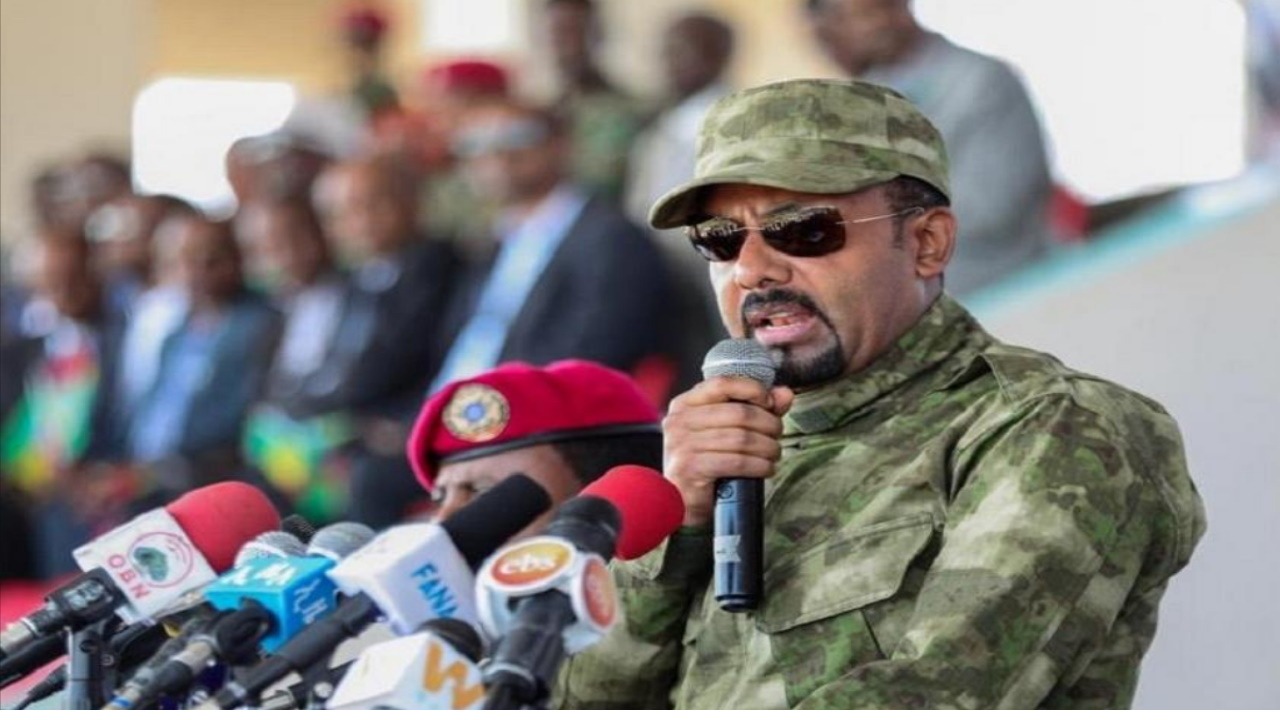
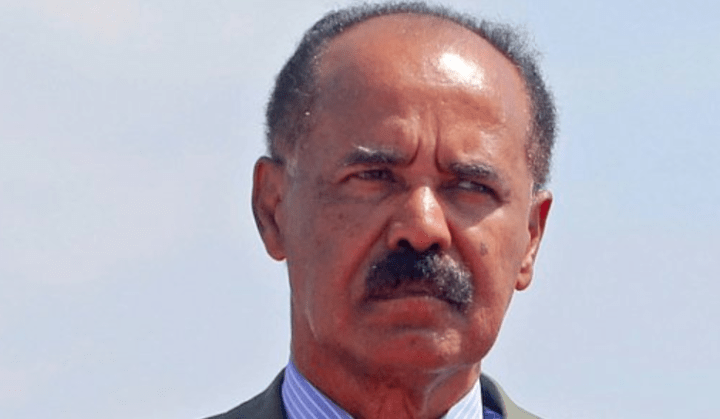
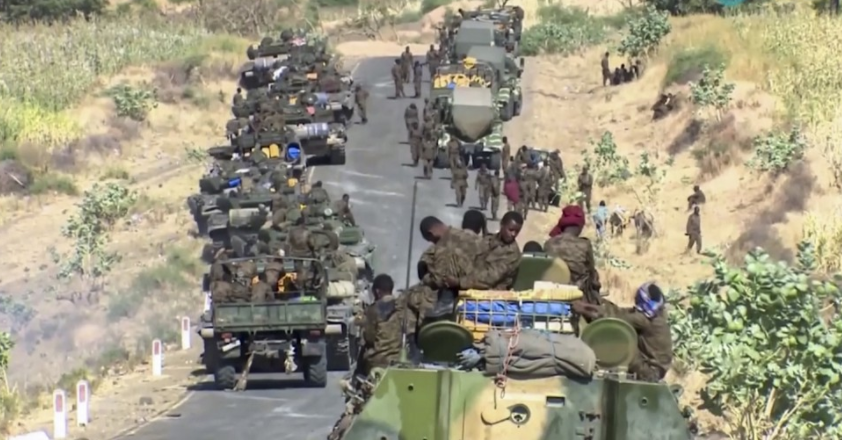
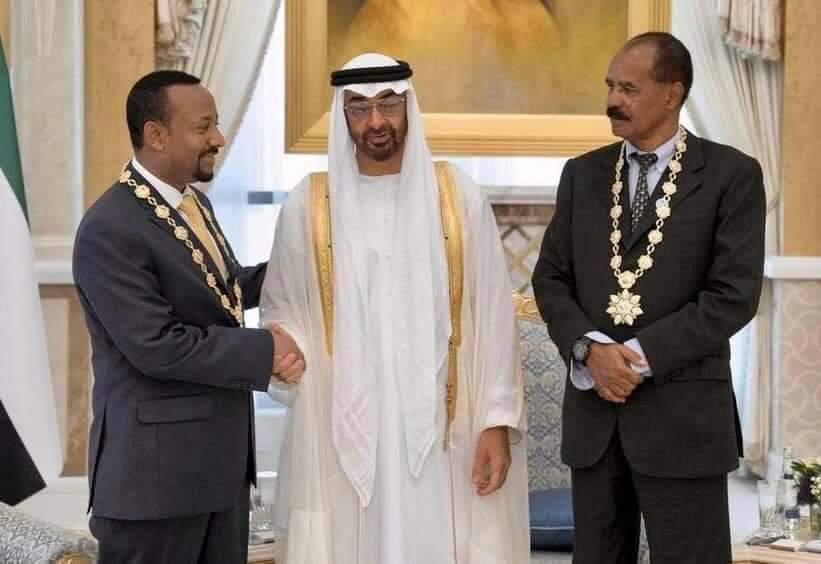 Dictators never fail to appreciate each other. Have destroyed yemen. Now, it’s ethiopian turn.They are committing genocide on Tigray people.But, UN and African Union are unable to stop this 21 century genocide happening in Tigray, Ethiopia. The UAE drones are bombing civilians.
Dictators never fail to appreciate each other. Have destroyed yemen. Now, it’s ethiopian turn.They are committing genocide on Tigray people.But, UN and African Union are unable to stop this 21 century genocide happening in Tigray, Ethiopia. The UAE drones are bombing civilians.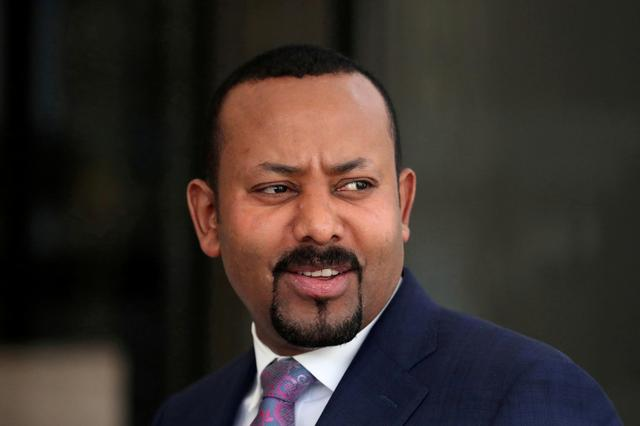 People have begun to understand Abiy Ahmed only since War on Tigray but he by his very nature was born anti-democracy, anti-human rights, blood lust. He was a chief spy, killer before 2018. butchered 10s of 1000s since 2018, directly assassinated 10s of high profile people.
People have begun to understand Abiy Ahmed only since War on Tigray but he by his very nature was born anti-democracy, anti-human rights, blood lust. He was a chief spy, killer before 2018. butchered 10s of 1000s since 2018, directly assassinated 10s of high profile people.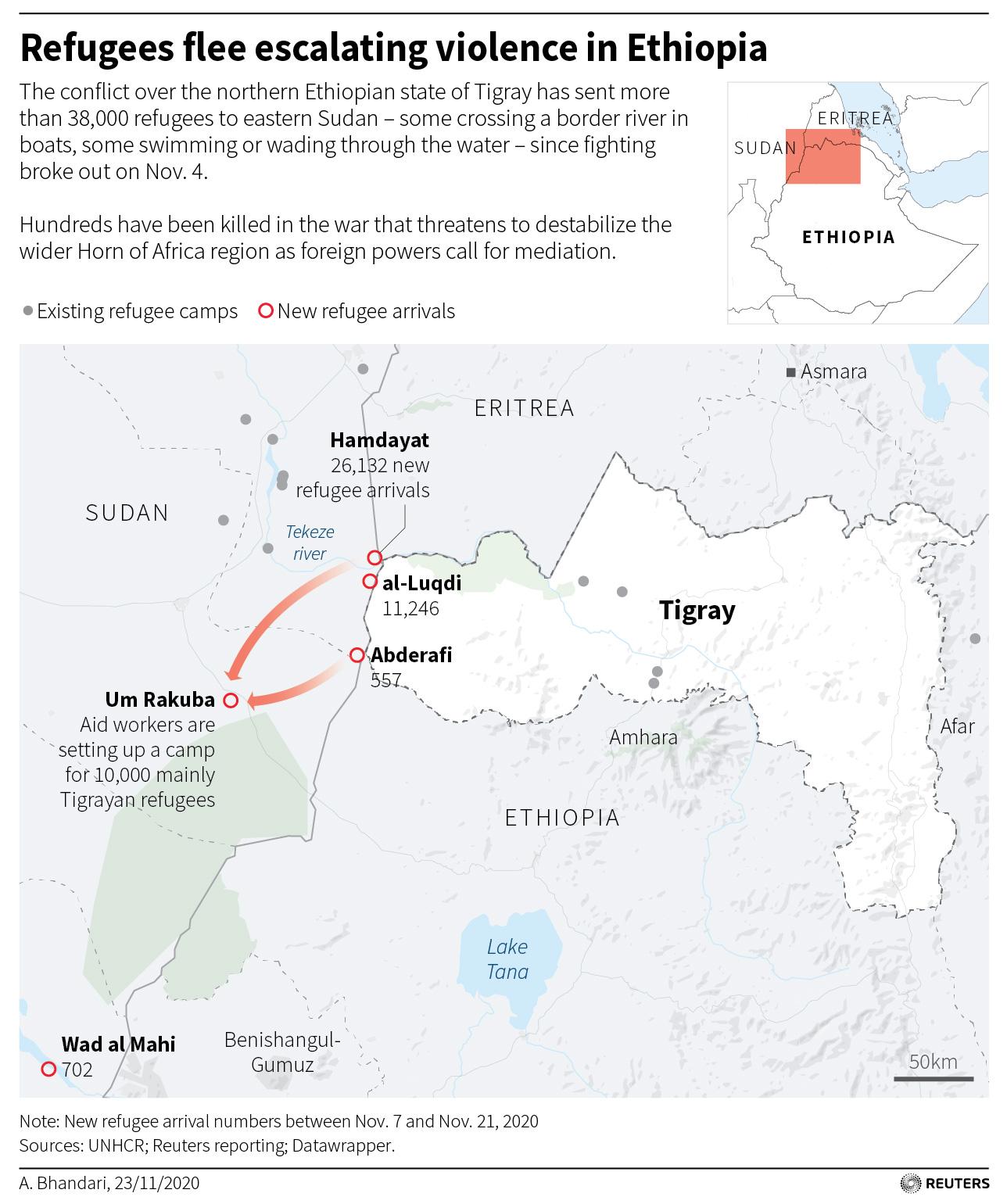
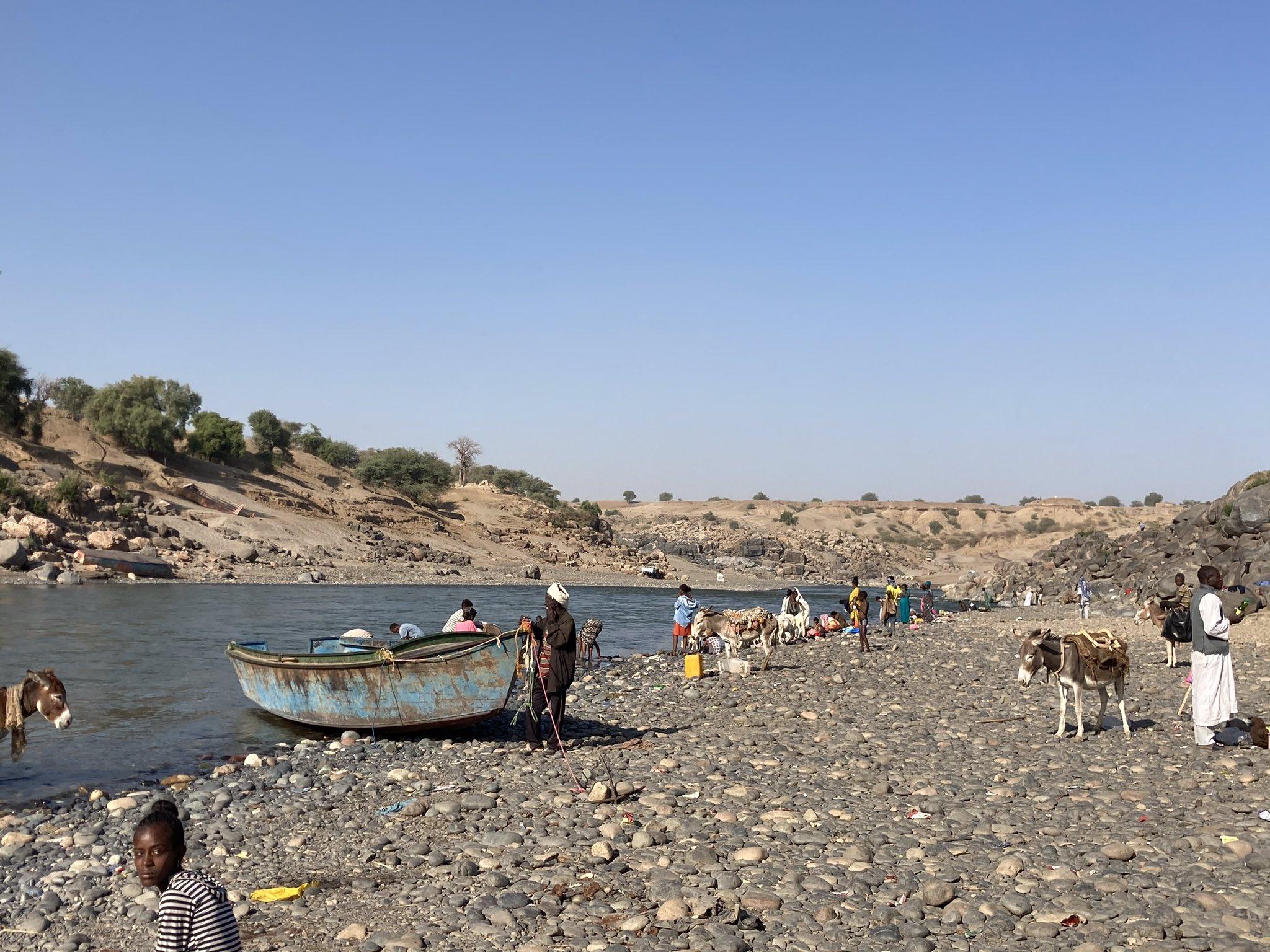 The number of refugees arriving in Sudan has reduced significantly. Over the last two days the average number has been around 700. At the peak of the arrivals, aid agencies recorded nearly 7,000 a day. Little is known about the situation in the ground inside Tigray.
The number of refugees arriving in Sudan has reduced significantly. Over the last two days the average number has been around 700. At the peak of the arrivals, aid agencies recorded nearly 7,000 a day. Little is known about the situation in the ground inside Tigray.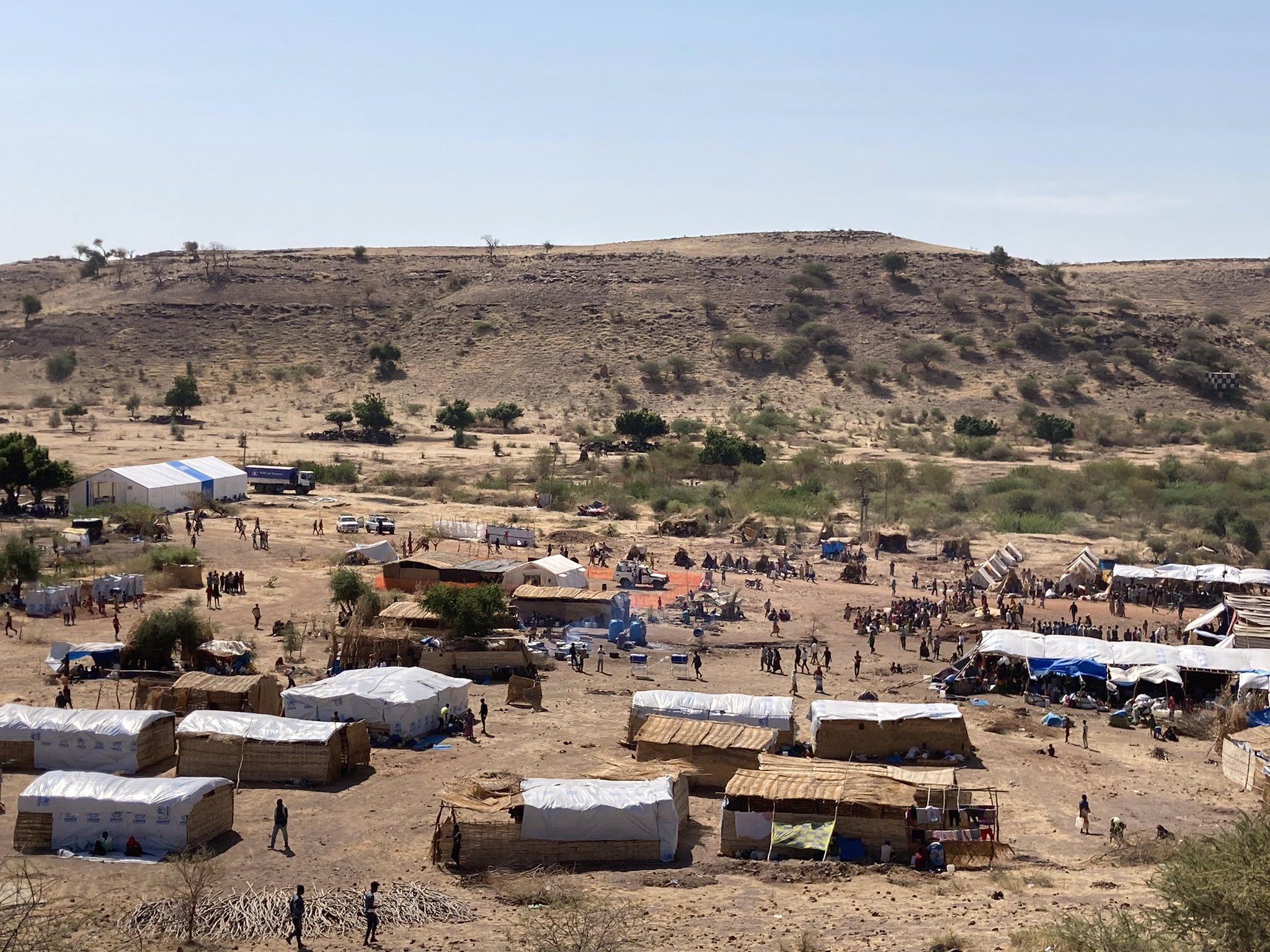 The Um Raquba camp is about 70km from the border. A lot of construction work is still going on – aid agencies building make-shift facilities and refugees putting up shelters.
The Um Raquba camp is about 70km from the border. A lot of construction work is still going on – aid agencies building make-shift facilities and refugees putting up shelters.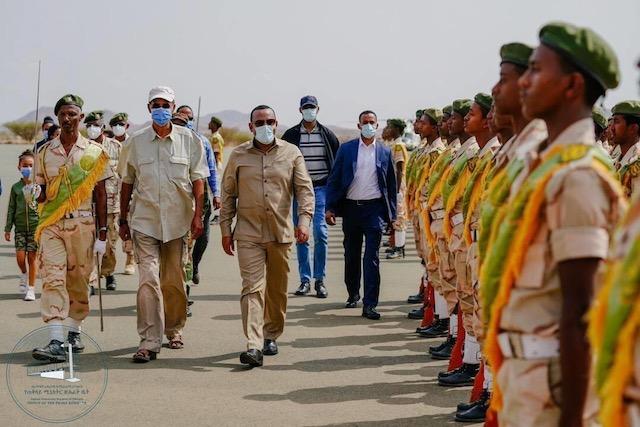
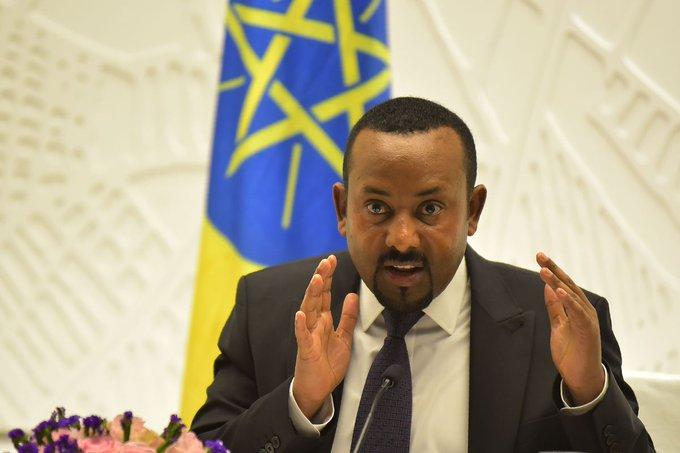
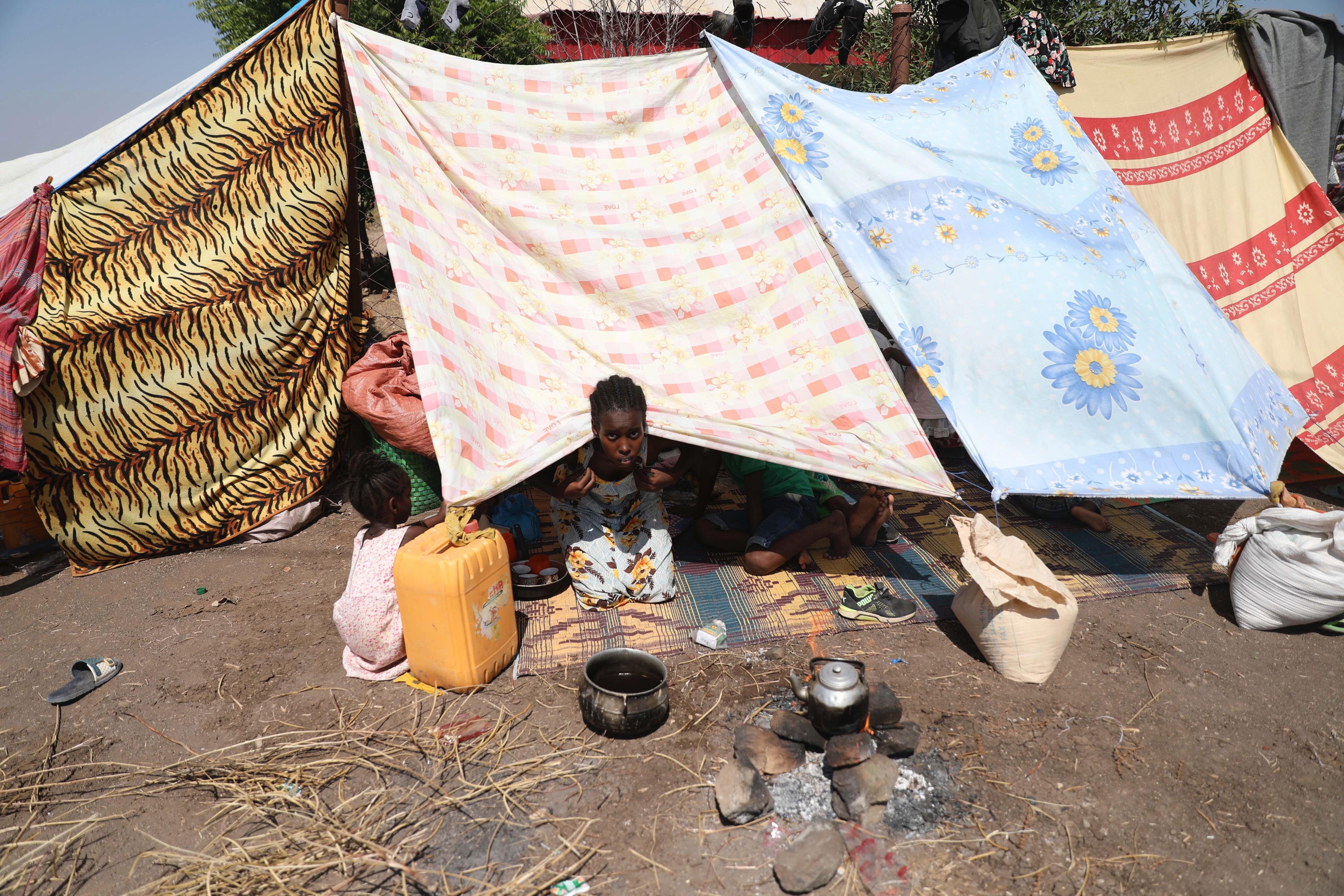 Thousands have been killed in the fighting, and 40,000 fled to Sudan, where they face food shortages – including over 300 malnourished children.
Thousands have been killed in the fighting, and 40,000 fled to Sudan, where they face food shortages – including over 300 malnourished children.